Japanese onsen towns
Japan has got to be one of the most fascinating countries on Earth with things that are unique to it – kawaii culture, real ninjas, the Shinkansen, anime… we could go on and on. Add Japanese onsen towns to that list and it becomes a must-visit for anyone looking for a travel experience that is truly one-of-a-kind.
Whether you’re looking for a place to relieve stress or simply want to try an authentic Japanese onsen experience, we‘ve rounded up 12 towns where you can soak in the benefits of these natural hot spring baths.
Table of Contents
- Japanese onsen towns
- What are some things to know before going to a Japanese onsen town?
- What are the different kinds of onsens in Japan?
- How much does it cost to visit an onsen town in Japan?
- 1. Kusatsu
- 2. Hakone
- 3. Lake Kawaguchiko
- 4. Nozawa
- 5. Ikaho
- 6. Ginzan
- 7. Shibu
- 8. Kinosaki
- 9. Jozankei
- 10. Noboribetsu
- 11. Beppu
- 12. Yufuin
- 13. Kurokawa
- – Bonus –
- Ibusuki
- Dogo Onsen Hokkan
- Toyosu Manyo Club
What are some things to know before going to a Japanese onsen town?
To soak up all the benefits of an onsen, you literally have to let your whole body soak it up. And yes, that means you’ll need to strip down to your birthday suit before hopping into the onsen with others. If you’re uncomfortable stripping down to enter an onsen, there are plenty of ashi-yu – foot baths – in most onsen towns. These are shallower pools that can usually be found along the streets of onsen towns. Plus, they’re usually free to enter for the public.
For ladies, if it’s that time of the month, refrain from visiting. Make sure you’re both sober as well as showering before stepping into the onsen so it’s clean for everyone.
Tattoos are usually not allowed at onsens, although some places are open to foreigners who have them if they cover their tattoos with a bandage or patch. Kinosaki is the only onsen town that allows tattoos without cover ups – great for those with large pieces of body art.
For a full breakdown on the do’s and don’ts, make sure to check out our onsen etiquette guide.
What are the different kinds of onsens in Japan?
Traditionally, onsens are located outdoors but indoor onsens are also common. Some are housed in a ryokan – traditional Japanese inns. Many hotels also offer direct onsen excess these days.
To be recognised as an onsen, the water and gases must be at least 25-degrees celsius and contain a mix of minerals. These are the most common types of minerals found, and the health benefits they provide.
| Types of minerals found in onsens | Benefits |
| Sulfur | Improves skin conditions like acne, eczema, and encourages blood flow in the vessels. |
| Iron | Soothes aching muscles and reduces inflammation. |
| Hydrogen carbonate | Relieves body fatigue, said to help lower blood sugar. |
| Sodium | Improves sleep quality and loosens stiff joints. |
| Calcium | Lowers blood pressure and aids blood flow. |
How much does it cost to visit an onsen town in Japan?
Here’s what the onsen towns in Japan offer, which region they’re in, along with the daytime admission fee and nearby accommodation if any.
| Onsen town | Region | Daytime admission fee | Nearby accommodation |
| Kusatsu | Near Tokyo | ¥1,100 (~S$9.33) | Kusatsu Onsen Eidaya |
| Hakone | ¥2,500 (~S$21.37) |
Hakone Green Plaza Hotel | |
| Lake Kawaguchiko | ¥1,300 (~S$11.07) | Hotel Mifujien | |
| Nozawa | Free | Nil | |
| Ikaho | ¥1,000 (~S$8.55) | Hotel Matsumotoro | |
| Ginzan | ¥1,000 (~S$8.55) | Soba and Waterfall Takimi-kan | |
| Kinosaki | Near Osaka | ¥1,500 (~S$12.82) | Nishimuraya Hotel Shogetsutei |
| Jozankei | Near Sopparo | ¥500 (~S$4.74) |
Many ryokan options |
| Noboribetsu | Free | Nil | |
| Beppu | Near Fukuoka | ¥1,000 (~S$8.55) | Ryotei Matsubaya |
| Yufuin | ¥1,000 (~S$8.55) | Musouen ryokan | |
| Kurokawa | ¥1,300 (~S$11.11) | Many ryokan options |
– Near Tokyo –
1. Kusatsu
Medicinal hot springs 2.5 hours from Tokyo
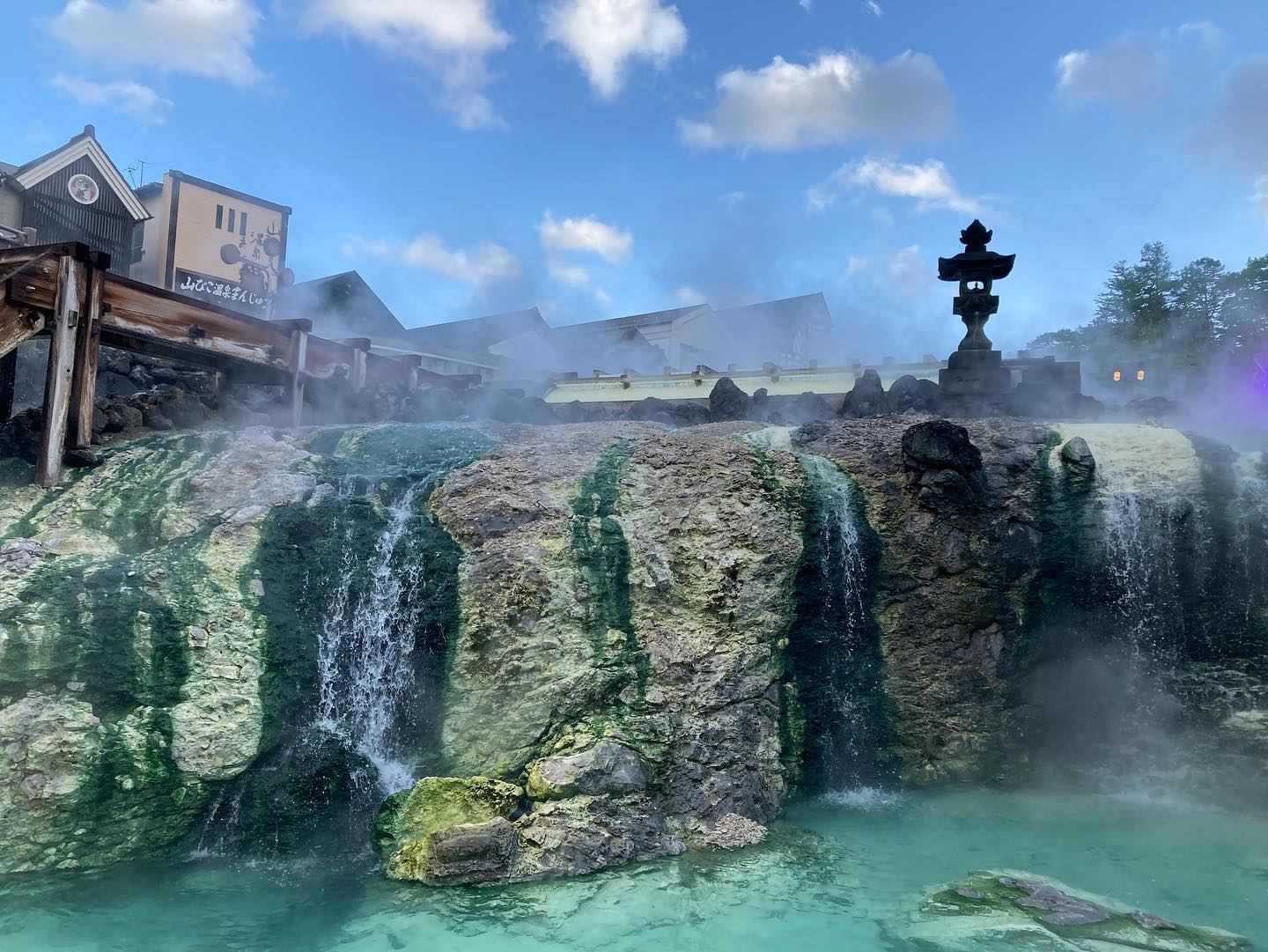 Yubatake.
Yubatake.
Image credit: @may_trip_gourmet via Instagram
Arguably the most famous onsen town in Japan, Kusatsu is just a 2.5-hour train ride from Tokyo. Most visitors tend to spend at least a night here in one of the many onsen hotels, but a day trip is also a good idea if you just want to experience the medicinal hot springs in a public bathhouse.
If there’s only one thing you see in Kusatsu, it’ll have to be Yubatake – a hot water field in the middle of the town that supplies natural hot spring water from the mountains in Gunma to the onsen hotels nearby.
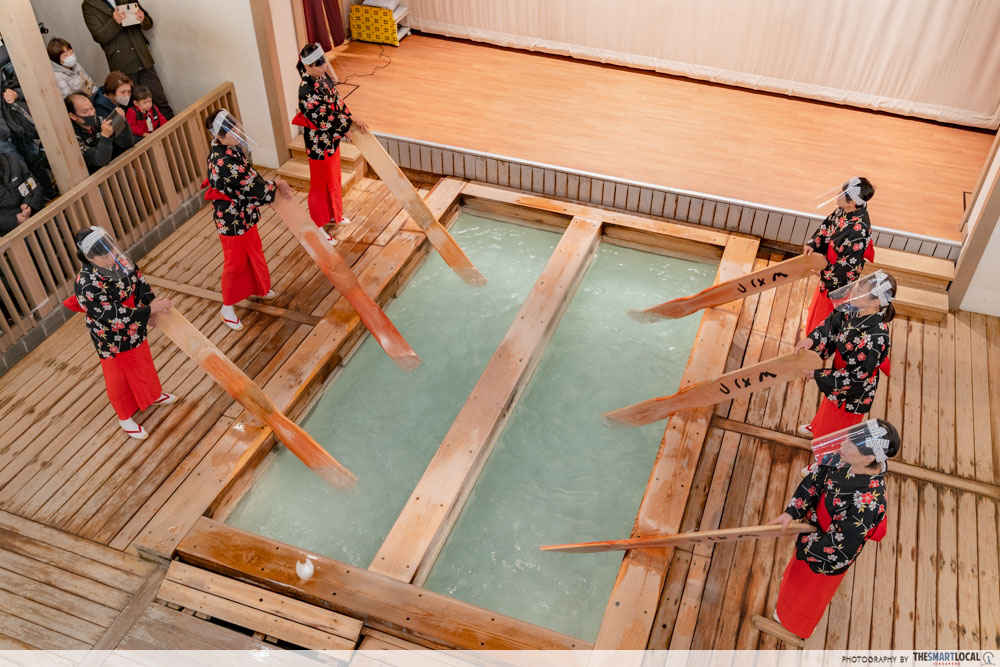
Yumomi ceremonial performance at Netsu-no-yu bath house.
A big reason to flock to this town is the water – the hot spring waters here are known to be rich in minerals and acidic enough to destroy bacteria. For centuries, the locals have been coming here with the belief that a dip in these waters will cure ailments and skin conditions such as eczema.
Another highlight of this town is a must-watch traditional ceremony known as Yumomi, where the hot spring waters are stirred with large wooden planks to cool down the temperature to a more comfortable degree for bathing. Make sure to catch the choreographed performance and have a go at stirring right after to have the complete onsen bath experience in Kusatsu.
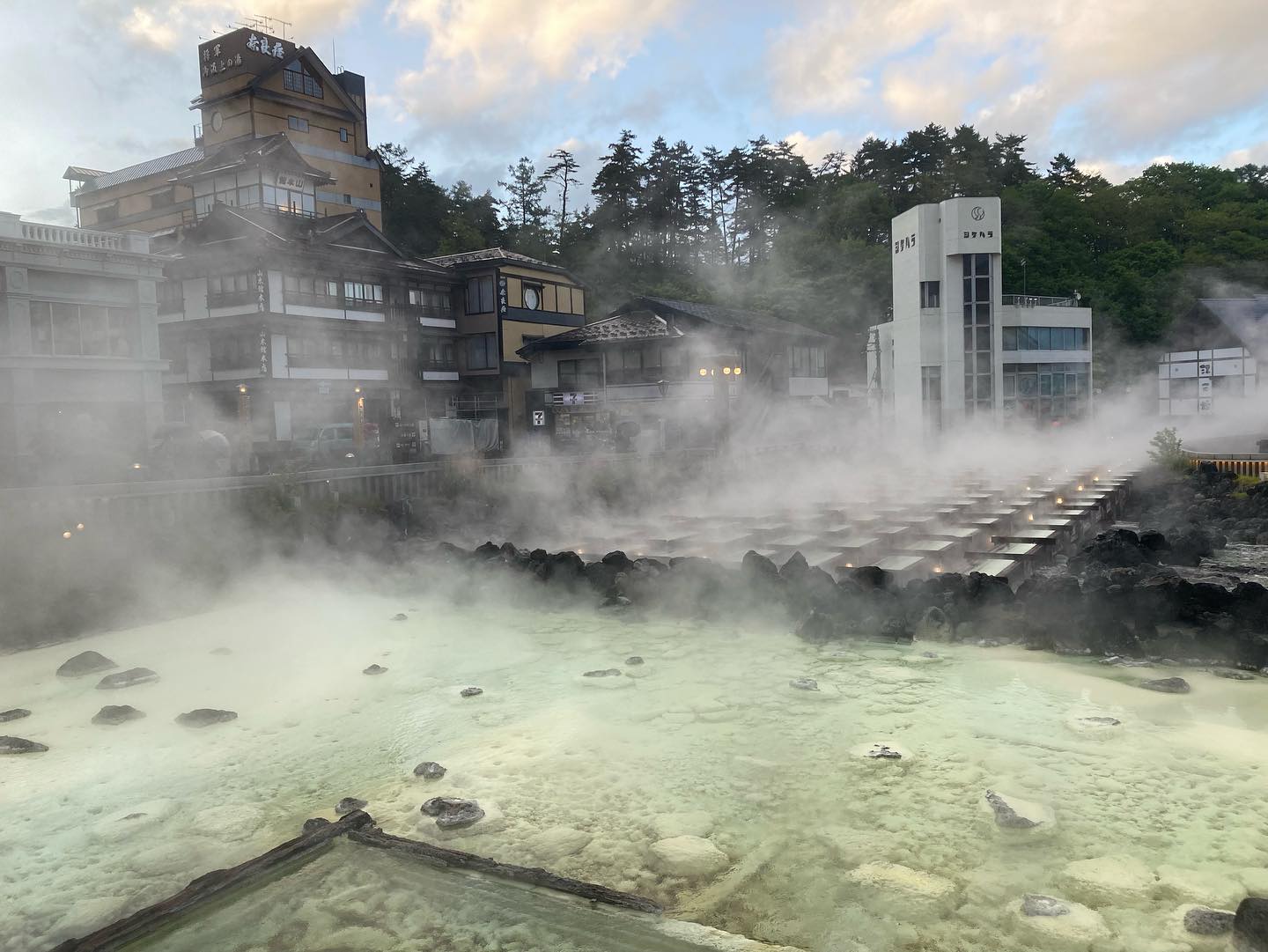 Image credit: @may_trip_gourmet via Instagram
Image credit: @may_trip_gourmet via Instagram
If you are able to withstand very hot temperatures, try the Jikan-yu bathing technique where you sit in a hot bath of about 48 degrees Celsius for just 3 minutes. Generations since the 17th century have been doing this to help boost blood circulation.
Book a 2D1N Kamikochi, Tateyama Kurobe Alpine Route & Kusatsu Onsen Tour from Tokyo (S$561.20).
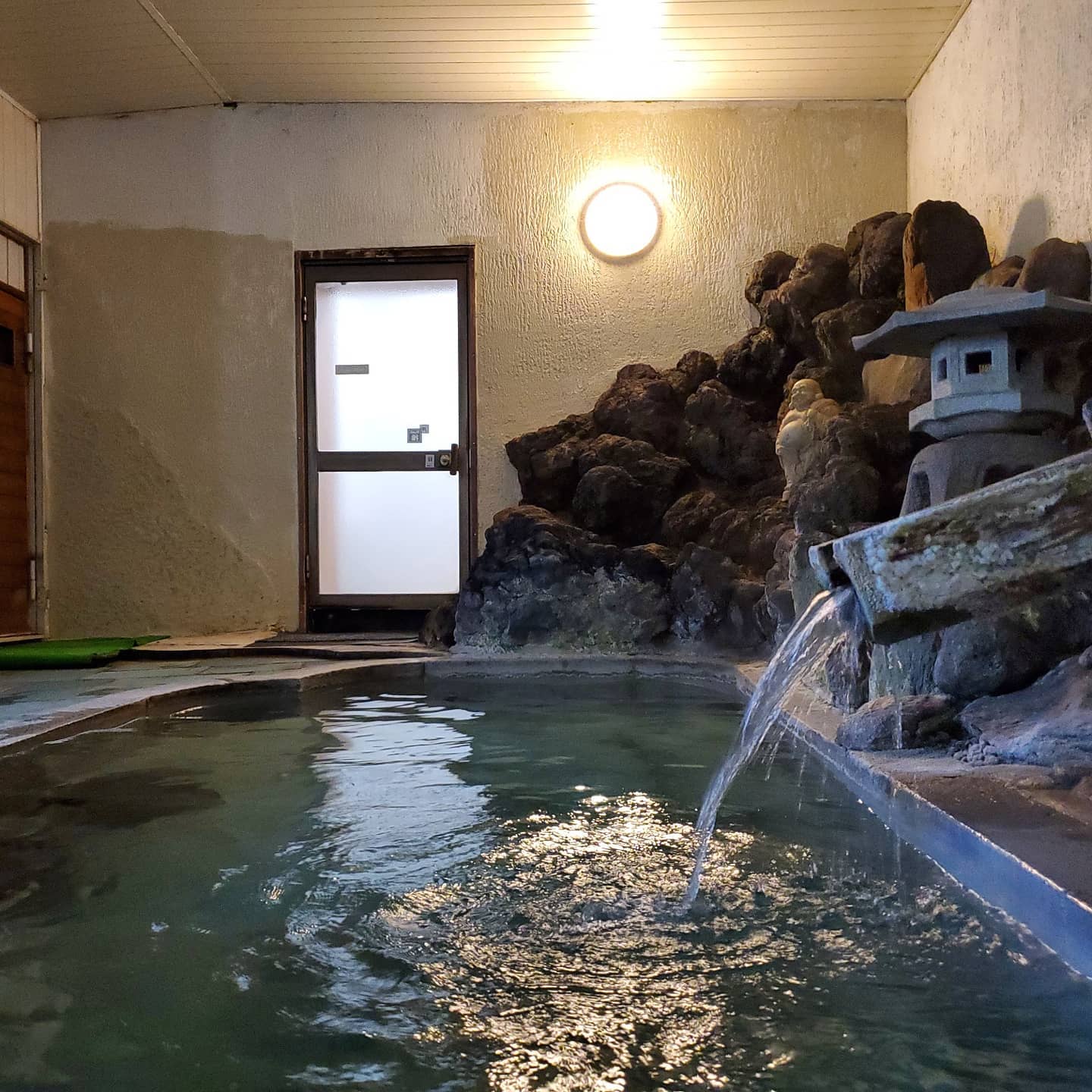 One of the communal baths at Kusatsu Onsen Eidaya.
One of the communal baths at Kusatsu Onsen Eidaya.
Image credit: @yurisao_kiku via Instagram
While there are plenty of ryokans in town, Kusatsu Onsen Eidaya is one you can check out for a cosy private bath should you decide to stay overnight. Featuring waters from Yubatake, the onsen options include 4 communal baths or staying in a villa with its very own individual bath.
As for beds, they’ve got both modern ones that we are used to and the traditional Japanese futon mattresses known as a shikibuton.
Getting there: Take the Limited Express Kusatsu from Ueno Station to Naganohara-Kusatsuguchi Station. Afterwards, hop on a bus to get to Kusatsu Onsen.
2. Hakone
17 hot springs to go onsen hopping
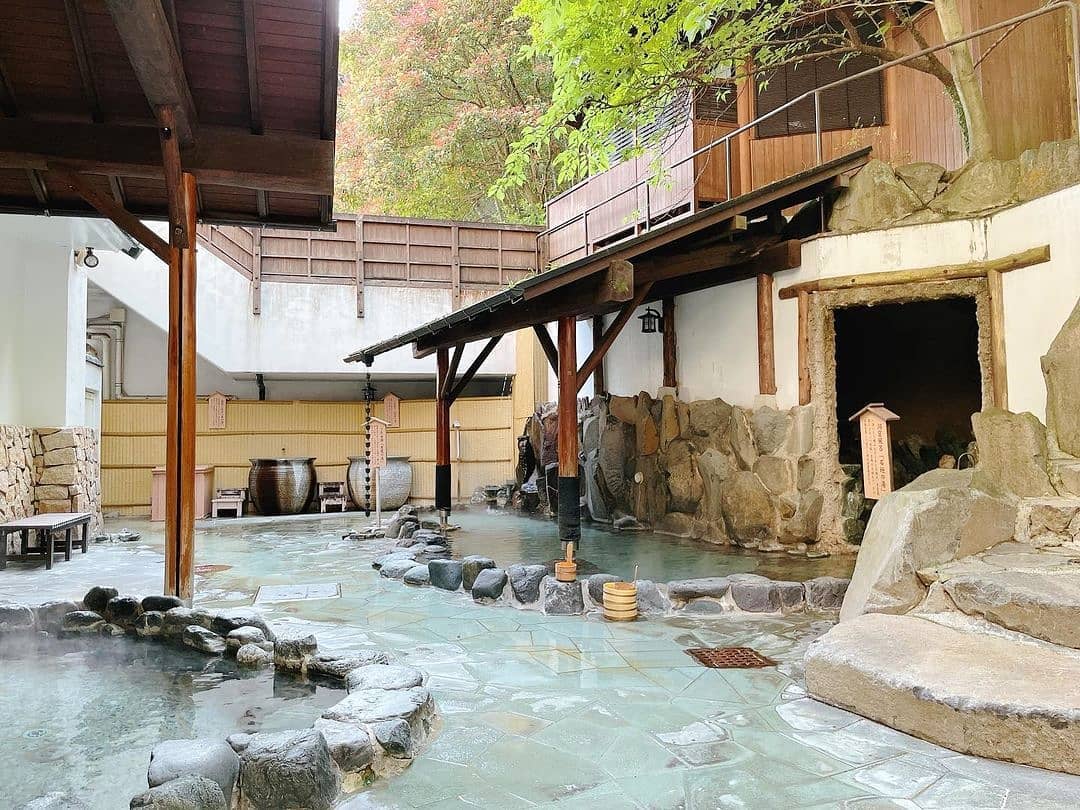
Outdoor baths at Hakone Kamun are made from stone and wood.
Image credit: @hakonekamon via Instagram
Hakone is pretty well known for its Japanese hot springs and because many tourists make a day trip from Tokyo, most of the hotels here offer day access to their bathing facilities.
There are also plenty of public bathhouses and ryokan are within walking distance with both outdoor and indoor baths to relax in.
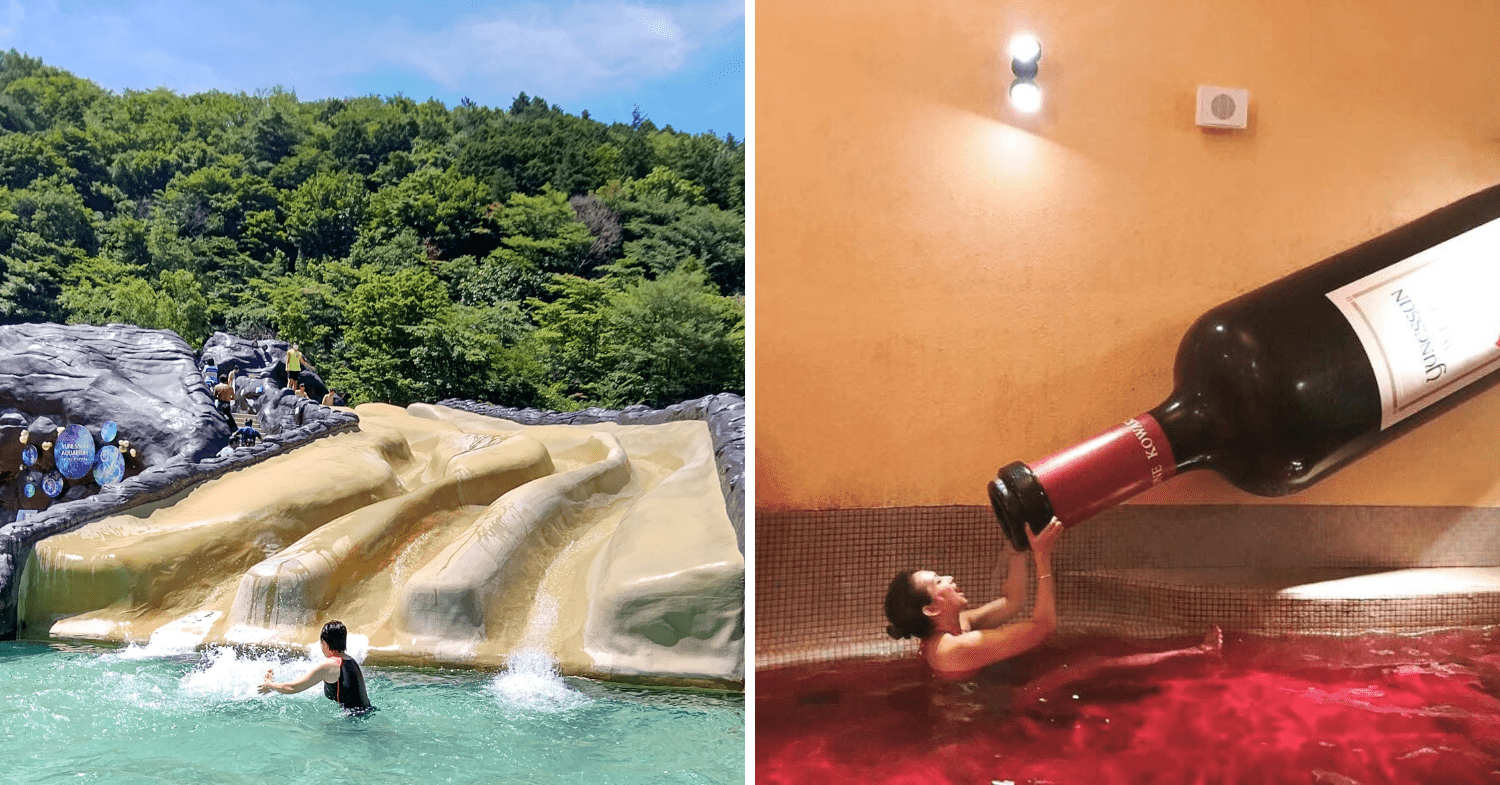 Image adapted from: ぽんぽん via Google Maps, @wulanjukanto via Instagram
Image adapted from: ぽんぽん via Google Maps, @wulanjukanto via Instagram
For a unique onsen experience, head to Hakone Kowakien Yunessun – a theme park and resort with water slides, waterfalls, and jacuzzis. Apart from hot spring waters, they even have the option to dip into hot baths with sake, green tea or wine.
Book a 1-day ticket to Hakone Kowaki-en Yunessun Hot Spring Theme Park (from S$21.35).
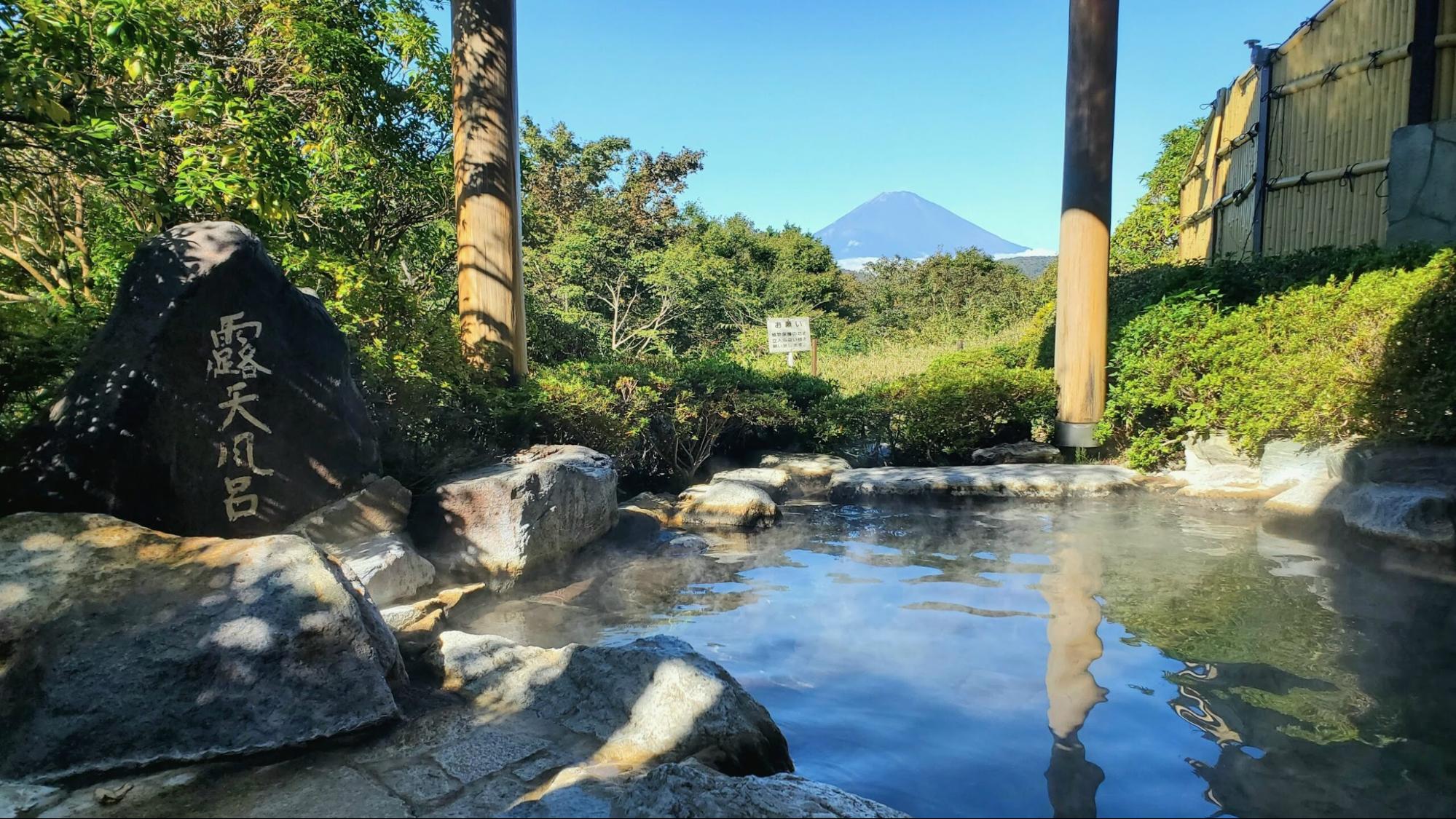 Sengokuhara Hot Spring at Hakone Green Plaza Hotel.
Sengokuhara Hot Spring at Hakone Green Plaza Hotel.
Image credit: 黄田国昌 via Google Maps
Those looking for something more secluded can venture further out to the valleys of Hakone and Lake Ashi for bath houses that offer a little more privacy. One such spot is Hakone Green Plaza Hotel, where daytime admission starts from just ¥2,500 (~S$21.37). You can even enjoy a complimentary chef’s meal while you’re at it.
The highlight? Being able to spot Mount Fuji in the distance from the outdoor thermal baths on a day when the skies are clear.
Getting there: Just hop on a train from Tokyo’s Shinjuku station, spend 2 hours admiring the mountain views, and then drop off at Hakone-Yumoto station.
3. Lake Kawaguchiko
View of Mount Fuji
Speaking of Mount Fuji, Lake Kawaguchiko is one of the most popular Japanese onsen towns precisely because you can see the magnificent mountain from almost any spot here. Located in Fuji Kawaguchiko Town, the lake is a scenic 1.5-hour drive from Tokyo or a 2.5-hour bus ride from Shinjuku station.
Book a 1-way bus ticket from Tokyo to Lake Kawaguchi (S$21.39).
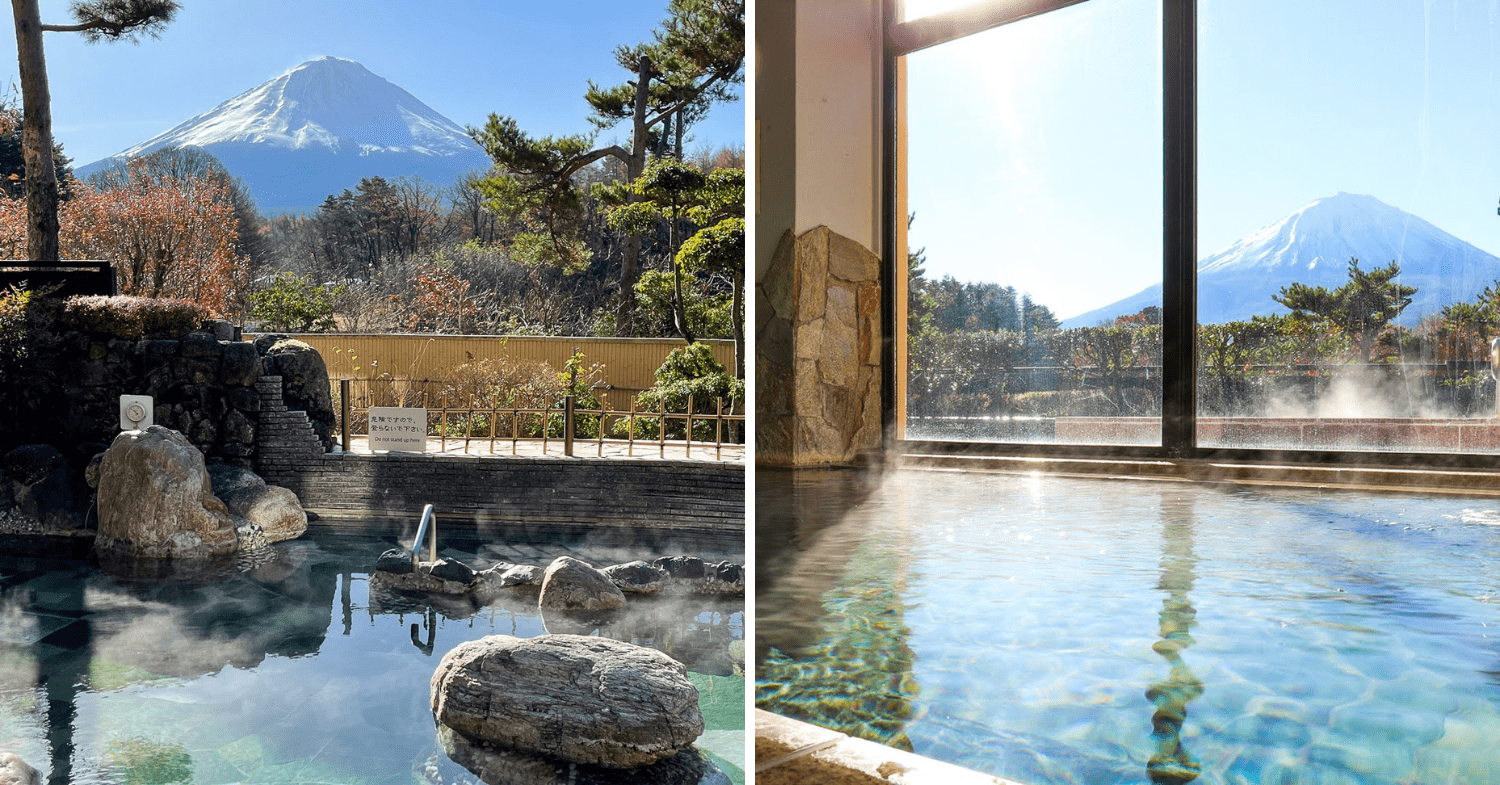 Outdoor and indoor baths at Yurari public onsen complex.
Outdoor and indoor baths at Yurari public onsen complex.
Image adapted from: @fuji_yurari via Instagram
If you’re here just for the day, make your way to Fuji Yurari Hot Spring which offers indoor and outdoor public baths from ¥1,300 (~S$11.07). For the ultimate pampering sesh, opt to add on a massage and check out the restaurant for authentic Japanese fare.
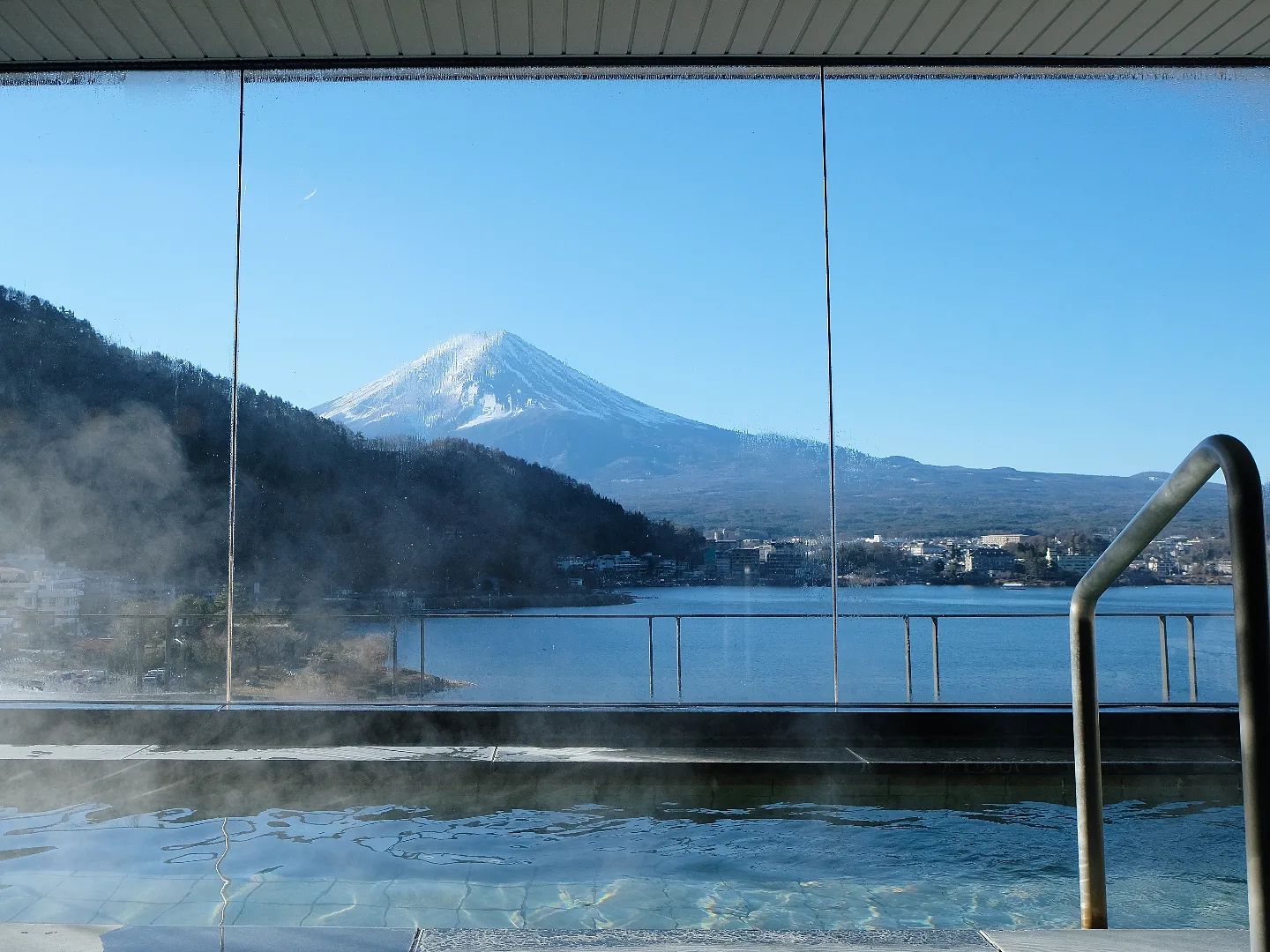 Hotel Mifujien
Hotel Mifujien
Image credit: @simpskwan
Hotel Mifujien is a retro-style hotel with 80s decor that also offers visitors afternoon daytime access to their onsen for ¥2,000 (~S$17.04) from 1pm-8pm. The communal bath on the 7th floor has panoramic views of Mount Fuji as well as the lake.
Getting there: From Shinjuku station, take a 2.5 hour bus ride to Fuji Kawaguchiko Town or a 1.5-hour drive from Tokyo.
4. Nozawa
Small & rustic onsen village with free baths
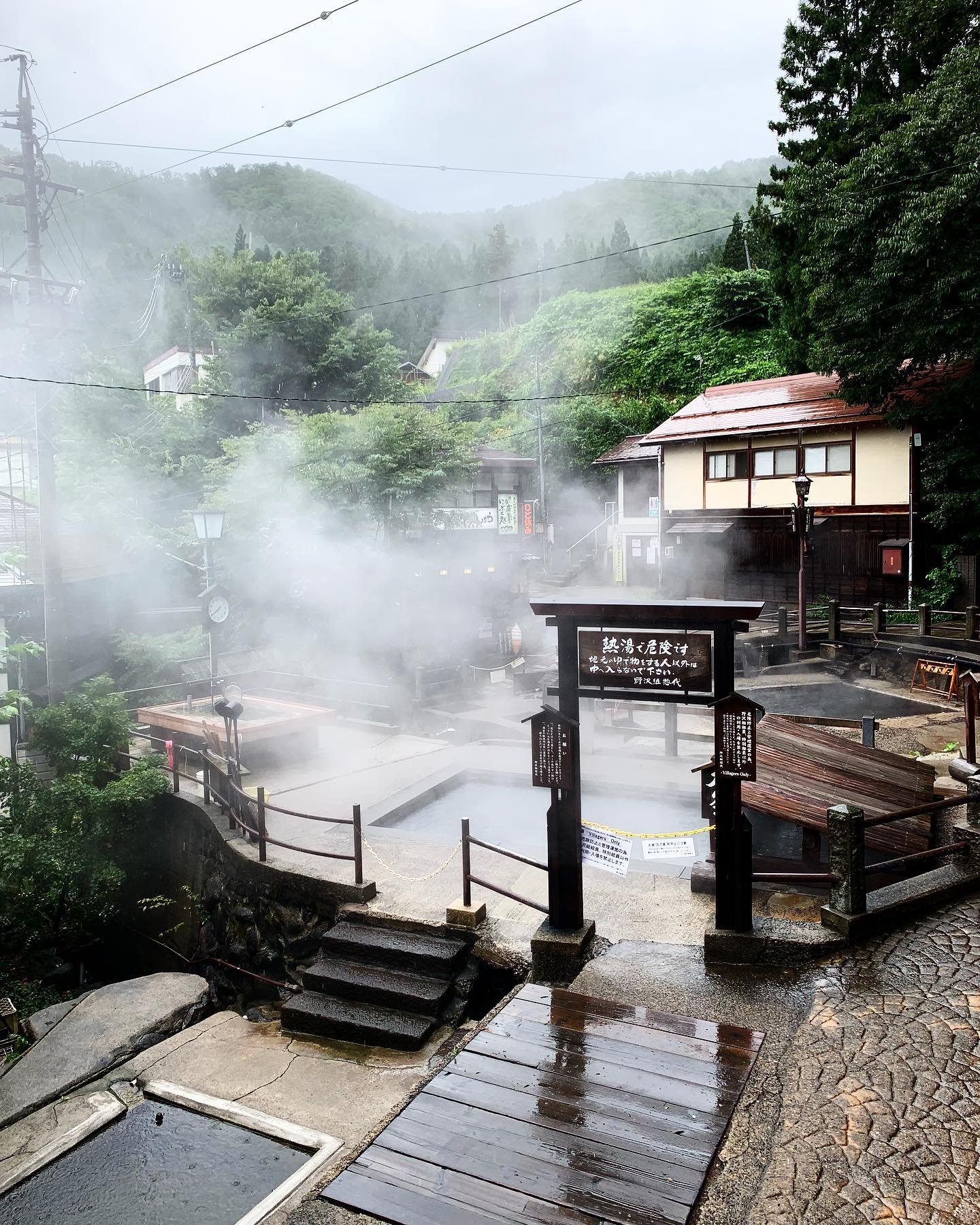 Image credit: @jacinta_matilda_ via Instagram
Image credit: @jacinta_matilda_ via Instagram
Head slightly further out of Tokyo and you’ll hit Nozawa, a small charming Japanese village 3.5 hours from the city. Although more popular as a snow skiing destination, the town has its own onsen culture too.
As you walk around the village, you’ll come across free public hot spring baths that welcome anyone to enter and use. These rely on donations from visitors for maintenance, so you’re encouraged to add a token amount to the boxes outside. You’ll also need to bring your own towels and toiletries.
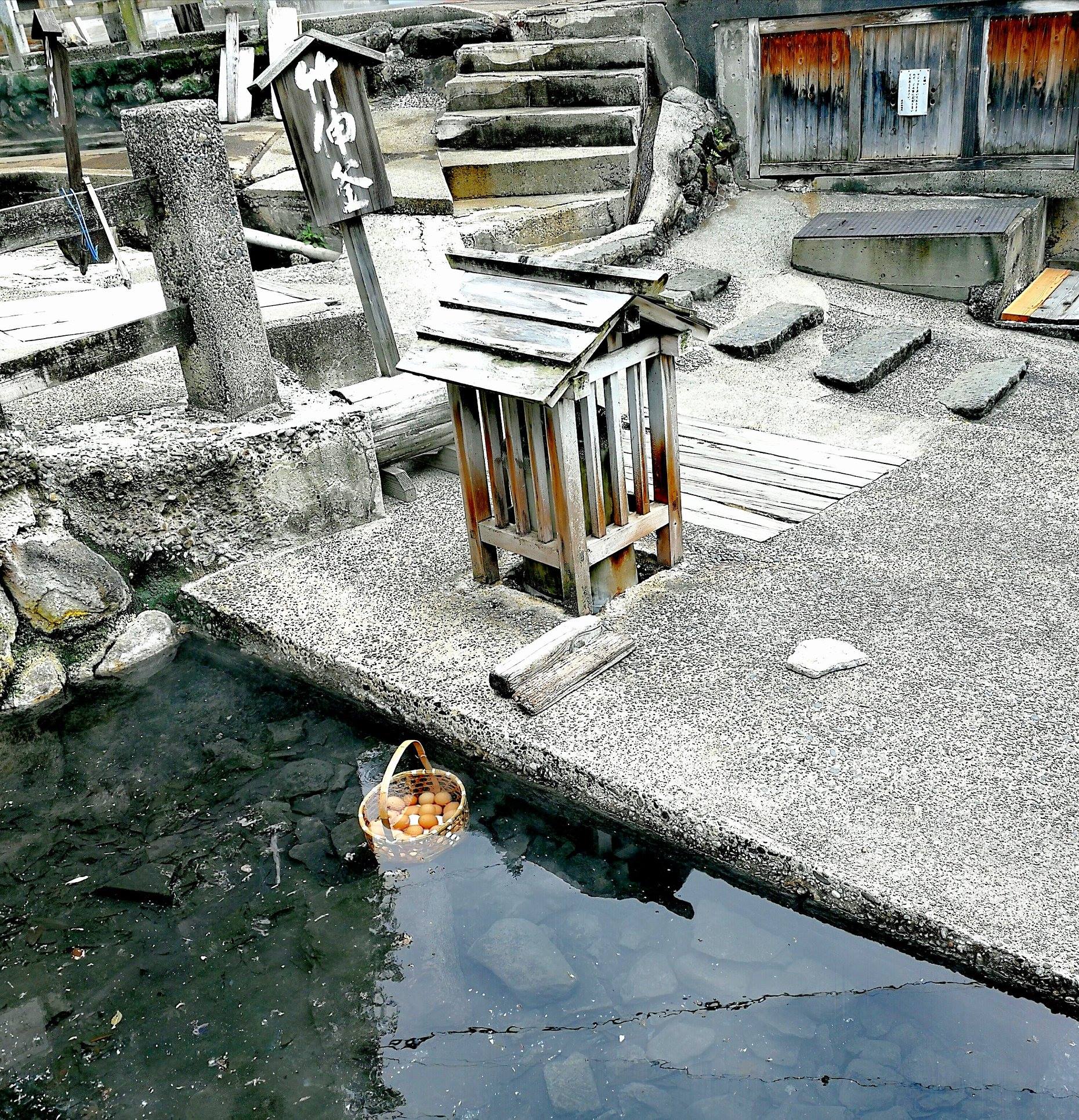 Image credit: Nozawa Onsen Facebook
Image credit: Nozawa Onsen Facebook
Don’t be alarmed if you see the locals boiling their vegetables and eggs by dipping their baskets into one of the hot springs – it’s a pretty common sight. In fact, you can try it for yourself and experience cooking onsen eggs at Ogama which has become the unofficial village “kitchen”. It is also the hottest spring in Nozawa with water temperatures nearing 100 degrees Celsius.
Getting there: Take the express bus from Kawaguchiko Station to Takasaki Station before switching to a train to Nagano. From there, take a bus again to Nozawa Onsen Chuo Terminal
5. Ikaho
Naturally gold hot spring waters
Giving the term “dripping in gold” a whole new meaning is Ikaho – an onsen town that boasts spring waters with natural hues of gold. Locally known as “Kogane no Yu”, this rare type of spring water gets its colour from the highly oxidised iron content. Plus, this town is just a 2-hour drive from Tokyo.
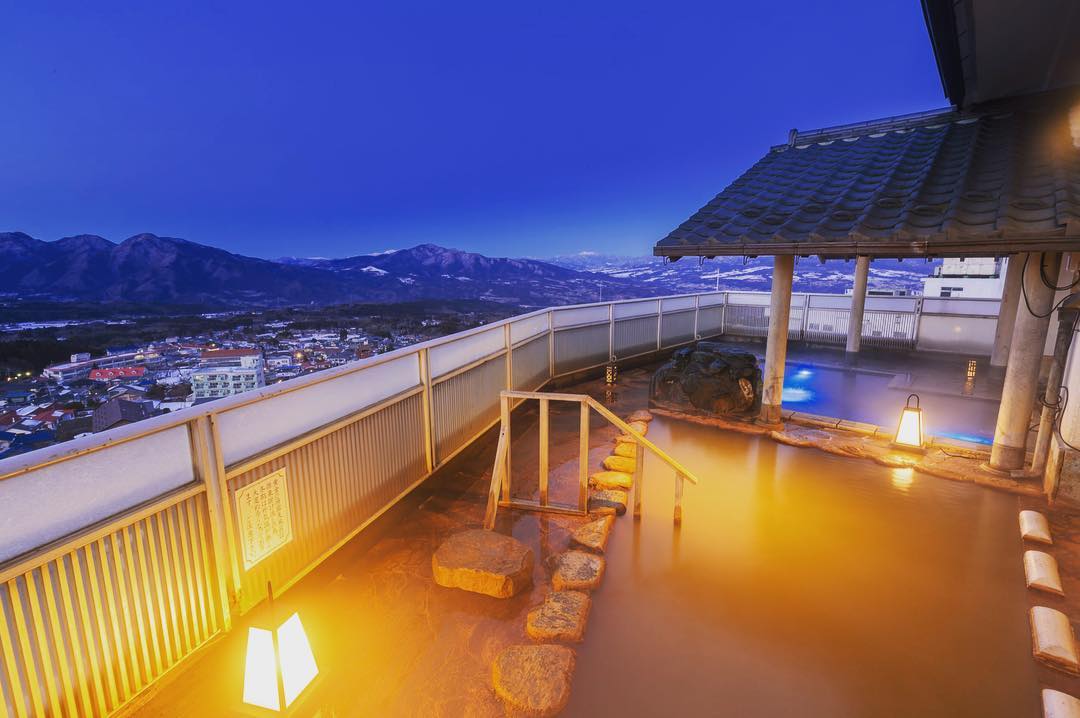
Hotel Matsumotoro, one of the inns where you can enjoy the gold spring waters.
Image credit: @ryokan.pinon via Instagram
While all hot springs in Japan are generally known to have properties that do wonders for one’s health and skin, the gold water here is said to have additional healing effects, particularly for scars from burns and cuts.
For an open-air onsen, Hotel Matsumotoro is a cosy family-friendly retreat that has both public and private baths overlooking a mountain range. The rooms here are equipped with amenities for babies such as a playpen and toys as well as a baby bath in the bathroom.
Getting there: From Takasaki Station, take the train to Shibukawa for 20 minutes, before transferring to a bus that goes to Ikaho Onsen in 20 minutes too.
6. Ginzan
Inspired bathhouse in Studio Ghibli’s Spirited Away
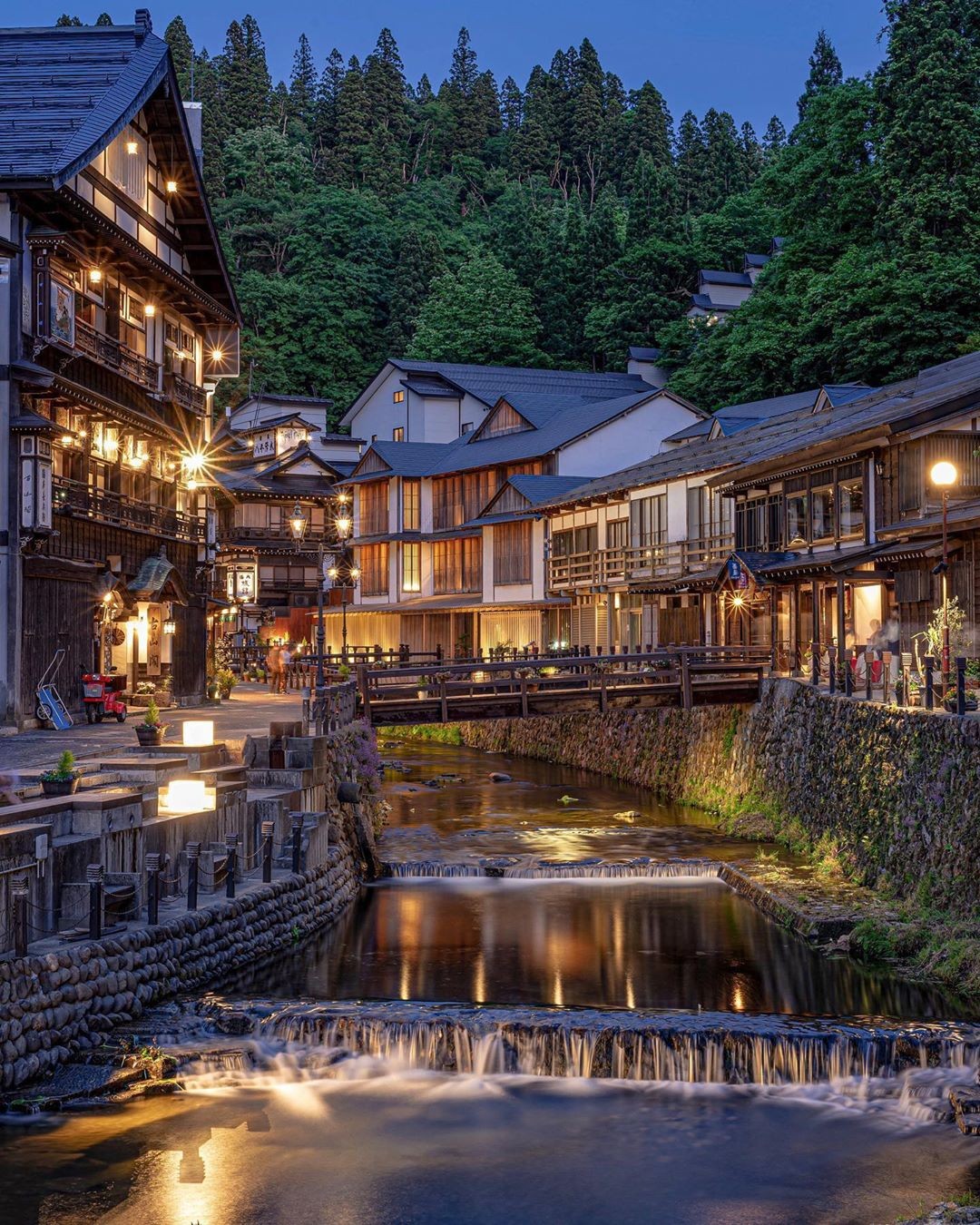
A picturesque 22m waterfall continuously flows through the town.
Image credit: @ginzanonsen via Instagram
Ginzan is a pretty secluded town that isn’t the easiest to get to, but it had to be on our list thanks to our love for all things Studio Ghibli-related.
When you get here and see the really chio ryokans lined up along the river, it’ll be worth the trip. Due to the narrow walking streets, the centre of the town is reserved for pedestrians only, so you’ll have to find parking just outside the town centre. Don’t worry, parking lots are just a 10-minute walk from the main area.
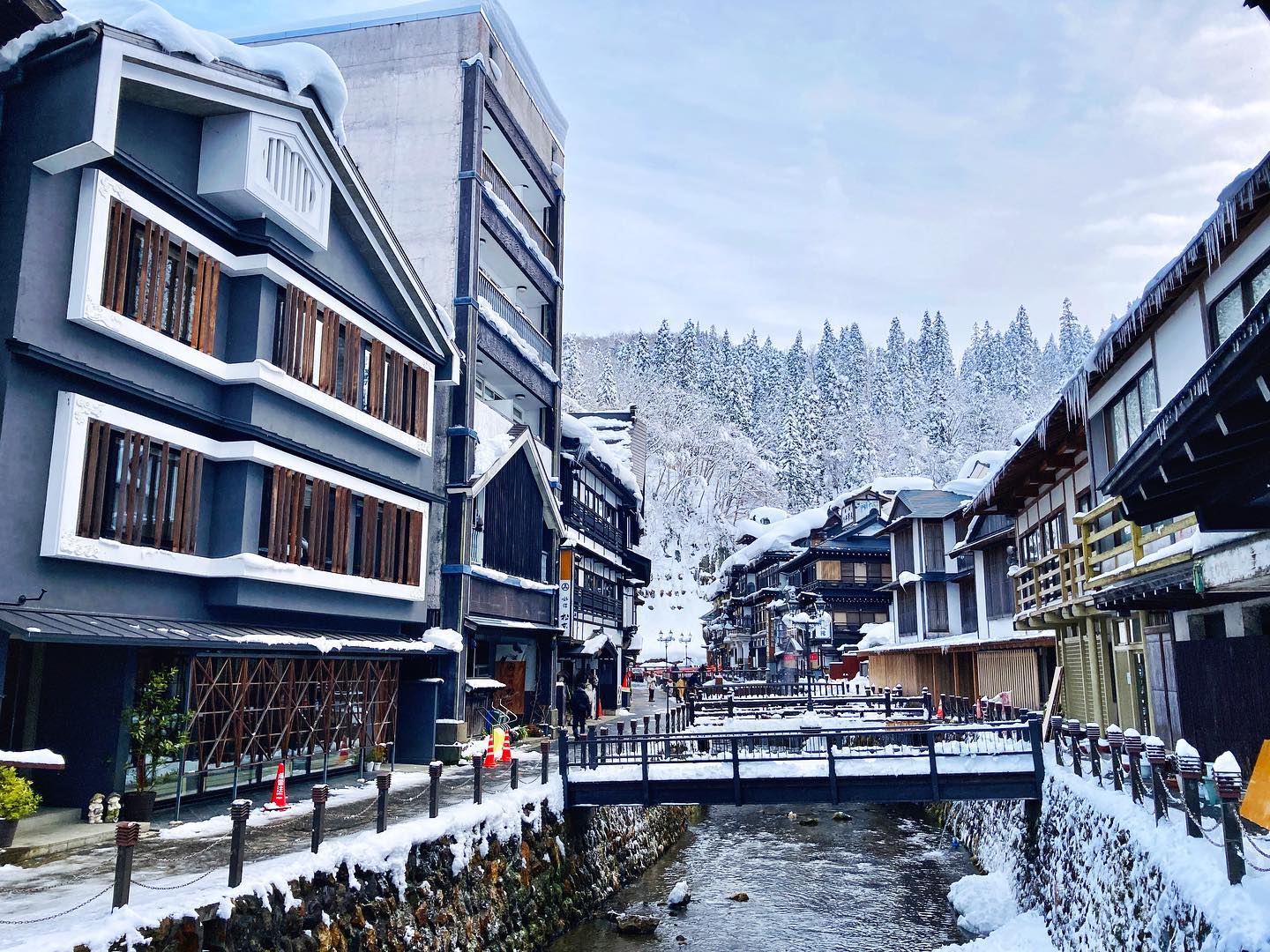 Ginzan looks particularly magical in winter when the town is covered in snow.
Ginzan looks particularly magical in winter when the town is covered in snow.
Image credit: @hsingyu455 via Instagram
Don a yukata – a traditional Japanese robe, and stroll through the pretty little town for your very own main character moment.
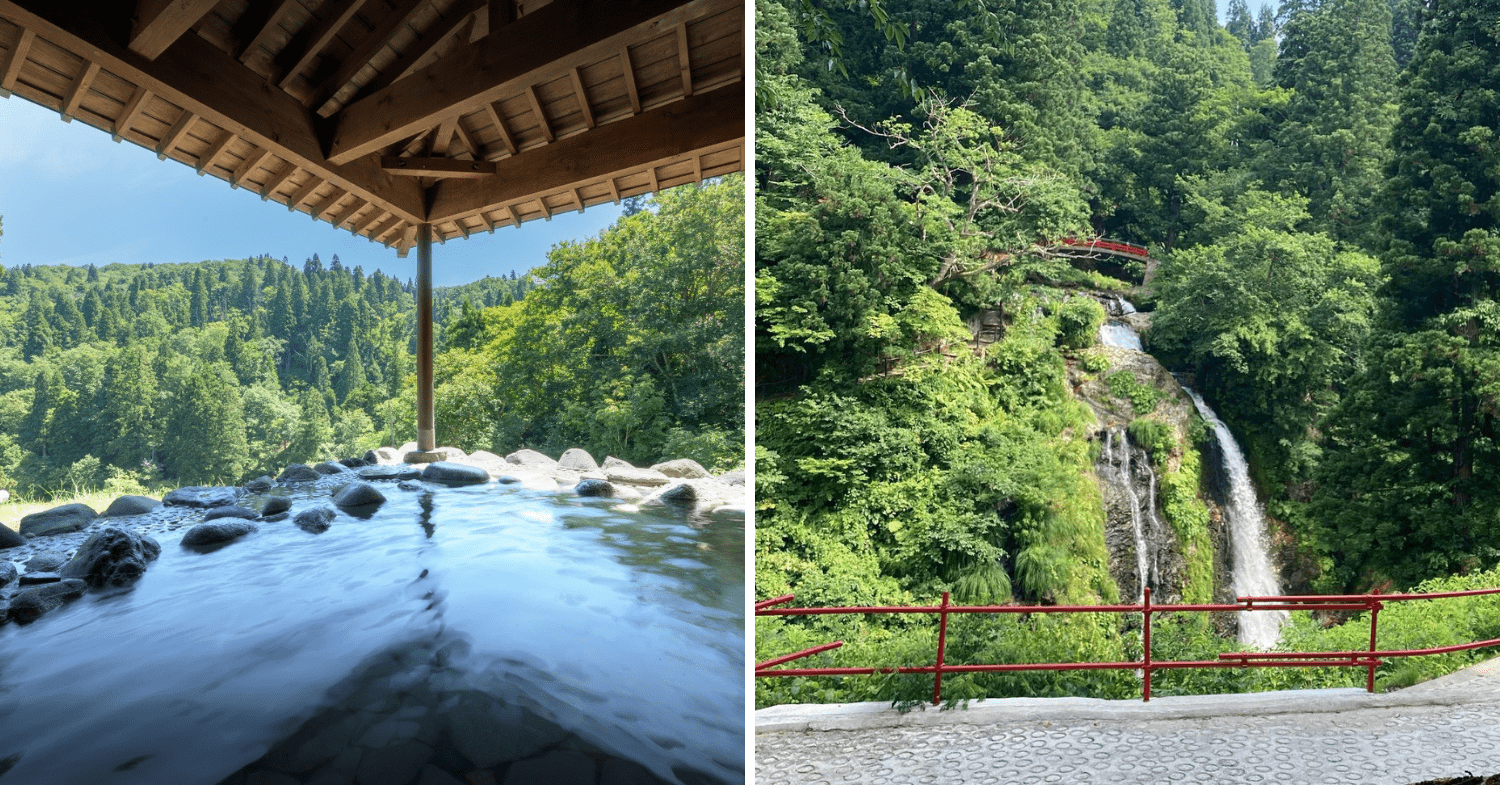 Image adapted from: @takimikan.official via Instagram
Image adapted from: @takimikan.official via Instagram
As for the onsen, you’ve got plenty of options in this town with most offering a similar experience. However, if you’ve got a thing for views, then stay at Soba and Waterfall Takimi-kan which is perched high atop a hill with rooms overlooking the waterfall.
Getting there: To get here you’ll either have to drive 5 hours from Tokyo or take a 1-hour domestic flight to Yamagata followed by an hour’s bus ride to the town.
7. Shibu
Historic town with traditional atmosphere & free-roaming monkeys
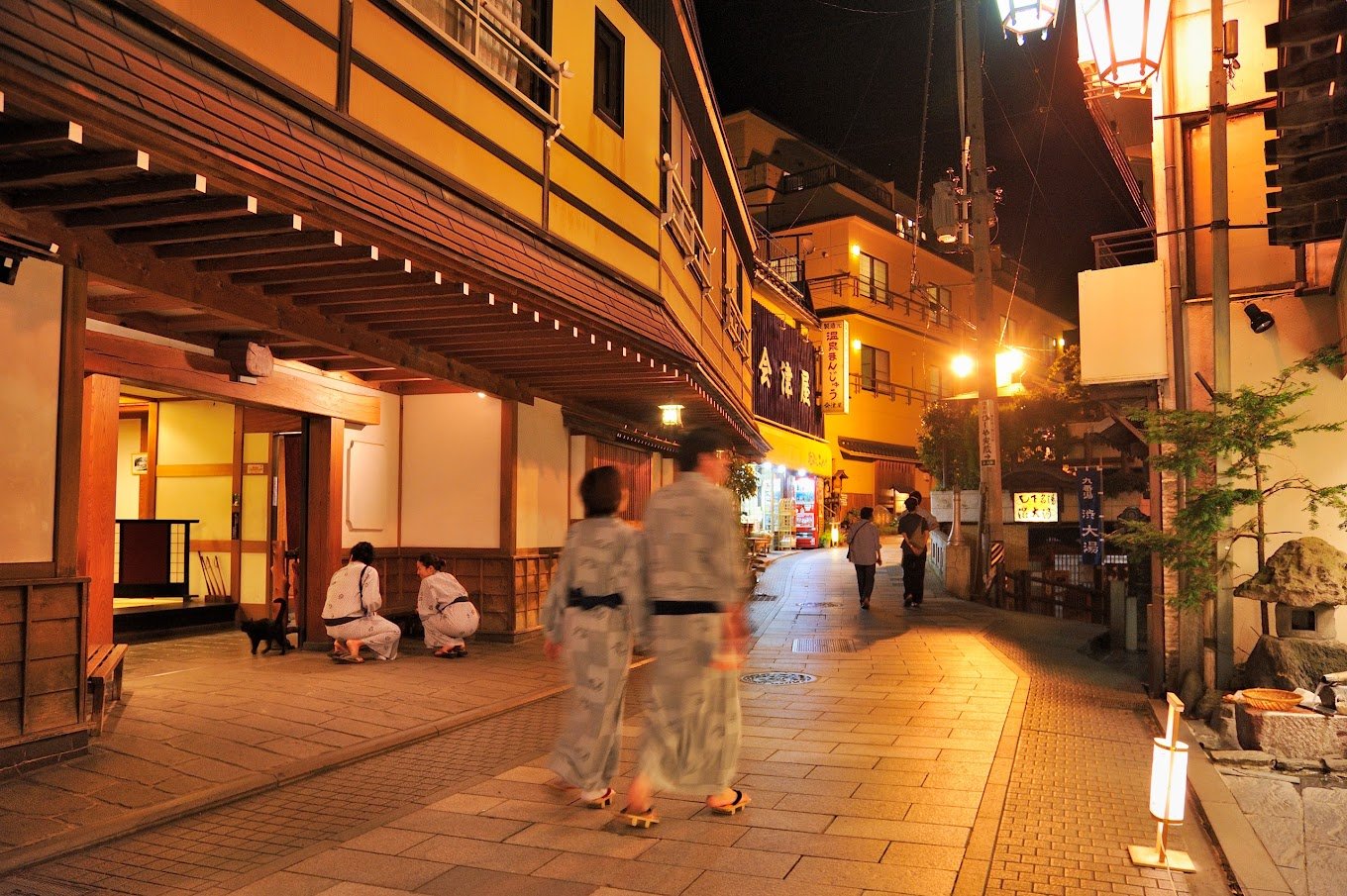 Image adapted from: Shibu Onsen Visitor Center 渋温泉旅館組合 via Google Maps
Image adapted from: Shibu Onsen Visitor Center 渋温泉旅館組合 via Google Maps
Shibu is a town that’s about 1,300 years old in Nagano Prefecture; it’s popular for its snow monkeys, Shiga Kogen Ski Resort, and onsen. It’s just a 2.5-hour train ride from Tokyo to Yudanaka Station, followed by a 5-minute shuttle bus to Shibu Onsen.
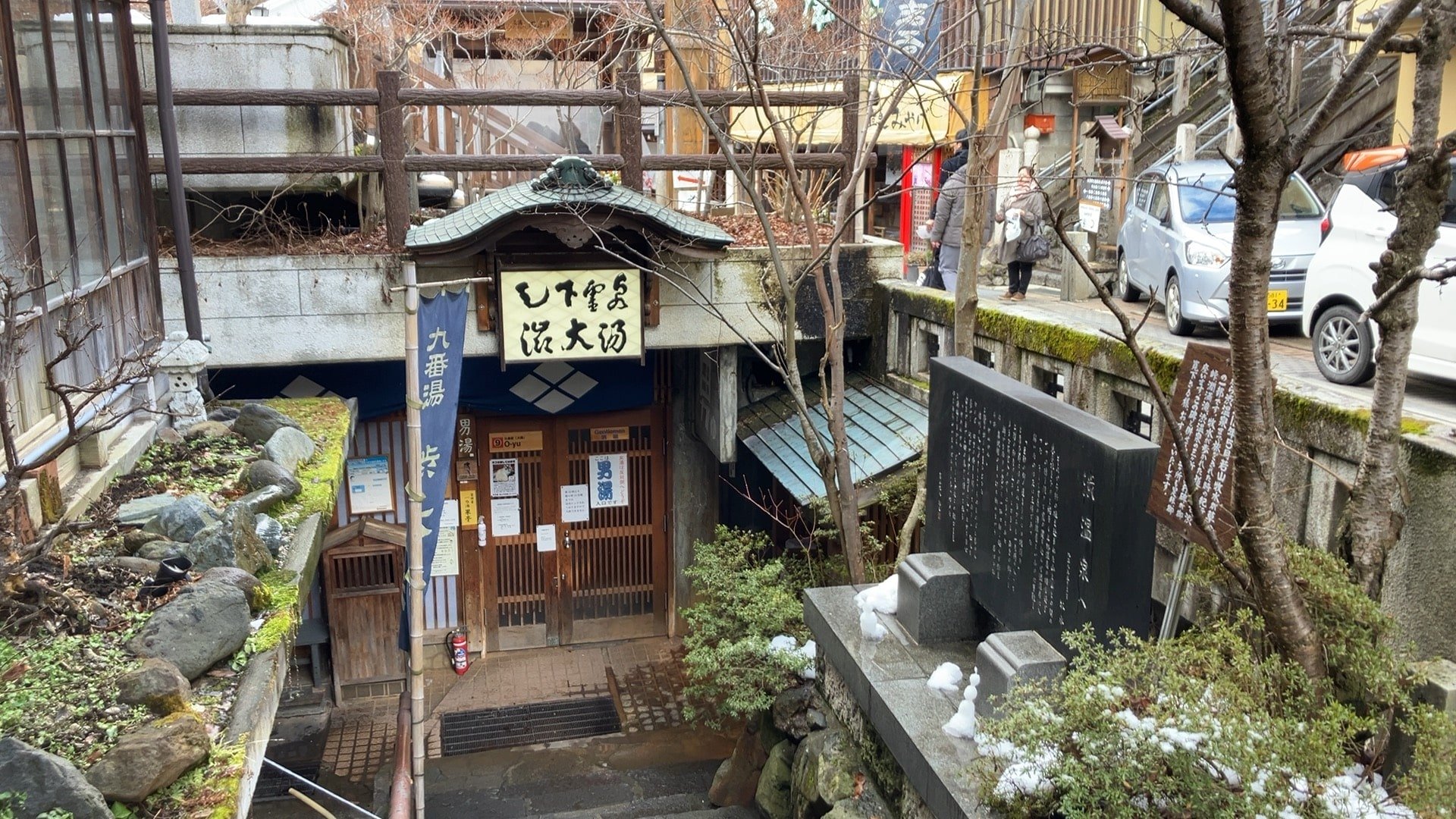 Image adapted from: さんえー via Google Maps
Image adapted from: さんえー via Google Maps
There are 9 bath houses in this town. For day-trippers, O-yu, also known as “Bathhouse No. 9”, would be the one to go to. Unlike most onsen that are reserved for people staying in guest houses and residents of Shibu, O-yu is the only one opened to day visitors. Plus it’s the biggest onsen in the area with gender-specific pools and footbaths with an affordable entry fee of ¥500/pax.
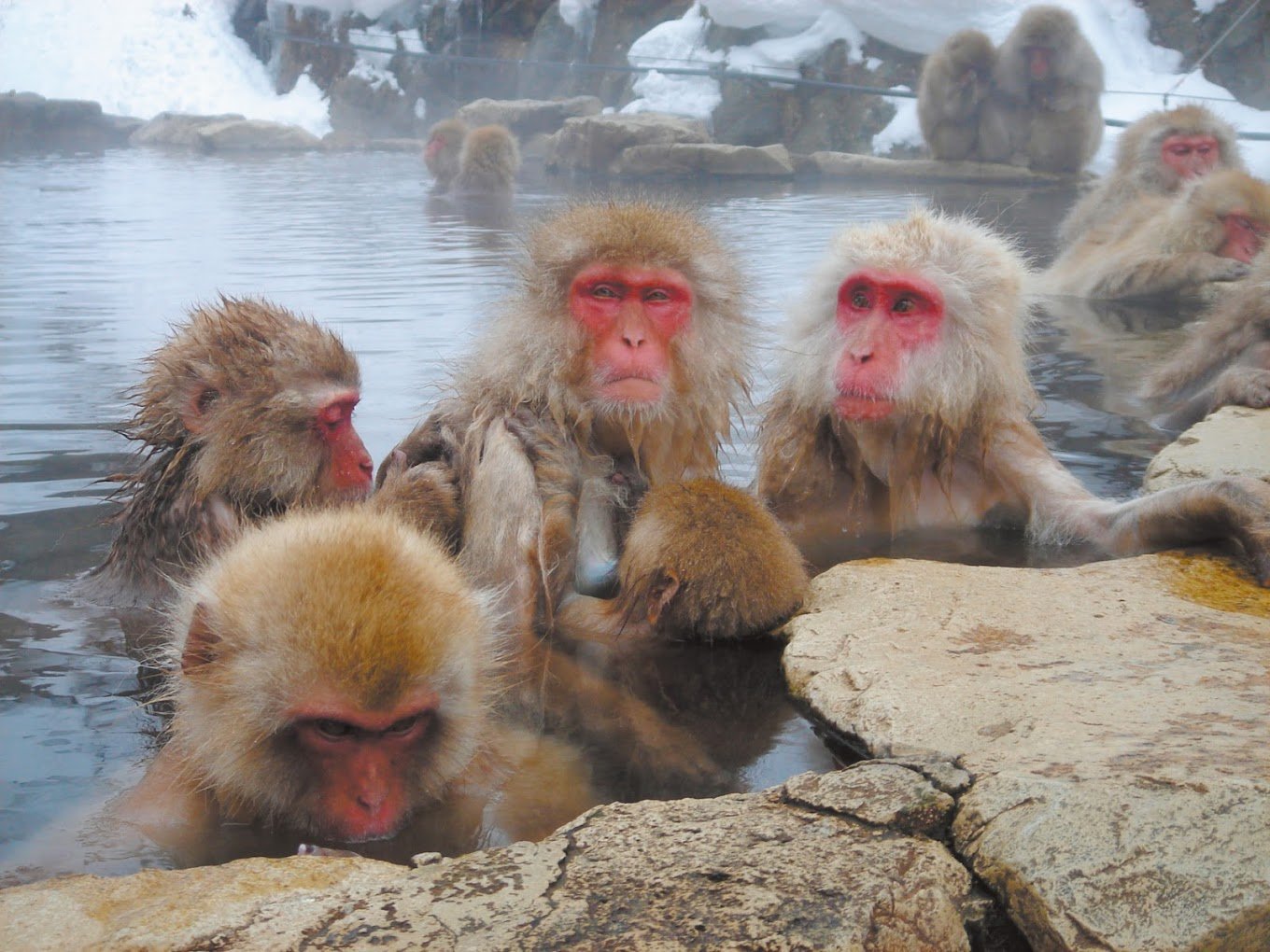 Image adapted from: Shibu Onsen Visitor Center 渋温泉旅館組合 via Google Maps
Image adapted from: Shibu Onsen Visitor Center 渋温泉旅館組合 via Google Maps
If you’re planning to stay longer, book a stay at Jigokudani Hot Spring Korakukan , a ryokan right beside the Jigokudani Monkey Park for ¥16,500/pax if you’re staying alone, and ¥15,000/pax if theres 2 or more people sharing the room.
The best time to visit is in the dead of winter – January or February, as that’s when it’ll be extra shiok to soak in the 41˚C onsen to escape the cold. Plus, you’ll be able to see the snow monkeys bathing in onsens at the monkey park.
– Near Osaka –
8. Kinosaki
Tattoo-friendly public hot springs
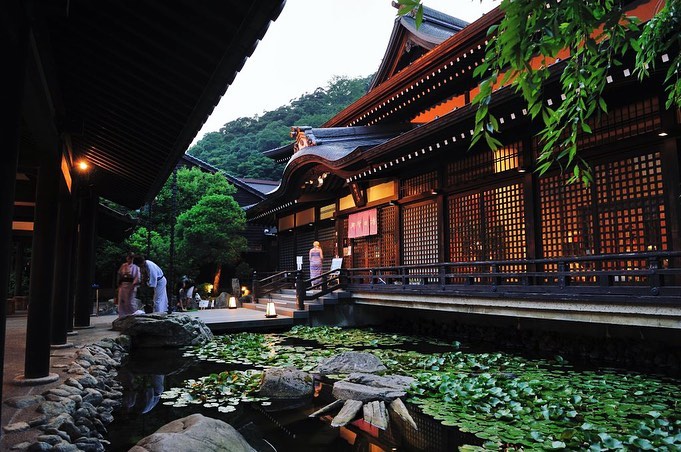
Goshono-yu public bathhouse.
Image credit: @kinosaki_onsen_official via Instagram
It’s a pretty well-known fact that most Japanese onsen towns deny entry to those with tattoos. Kinosaki is one of the only few that welcomes those with permanent ink into its 7 public hot springs.
2.5 hours from Kyoto or 3 hours from Osaka, the town can be easily explored on foot with ryokans lined up one after the other. And if you’re staying in one of the ryokan, you’ll receive a free pass to access all 7 public bathhouses. Otherwise, the cost for a daytime hot spring pass is ¥1,500 (~S$12.82).
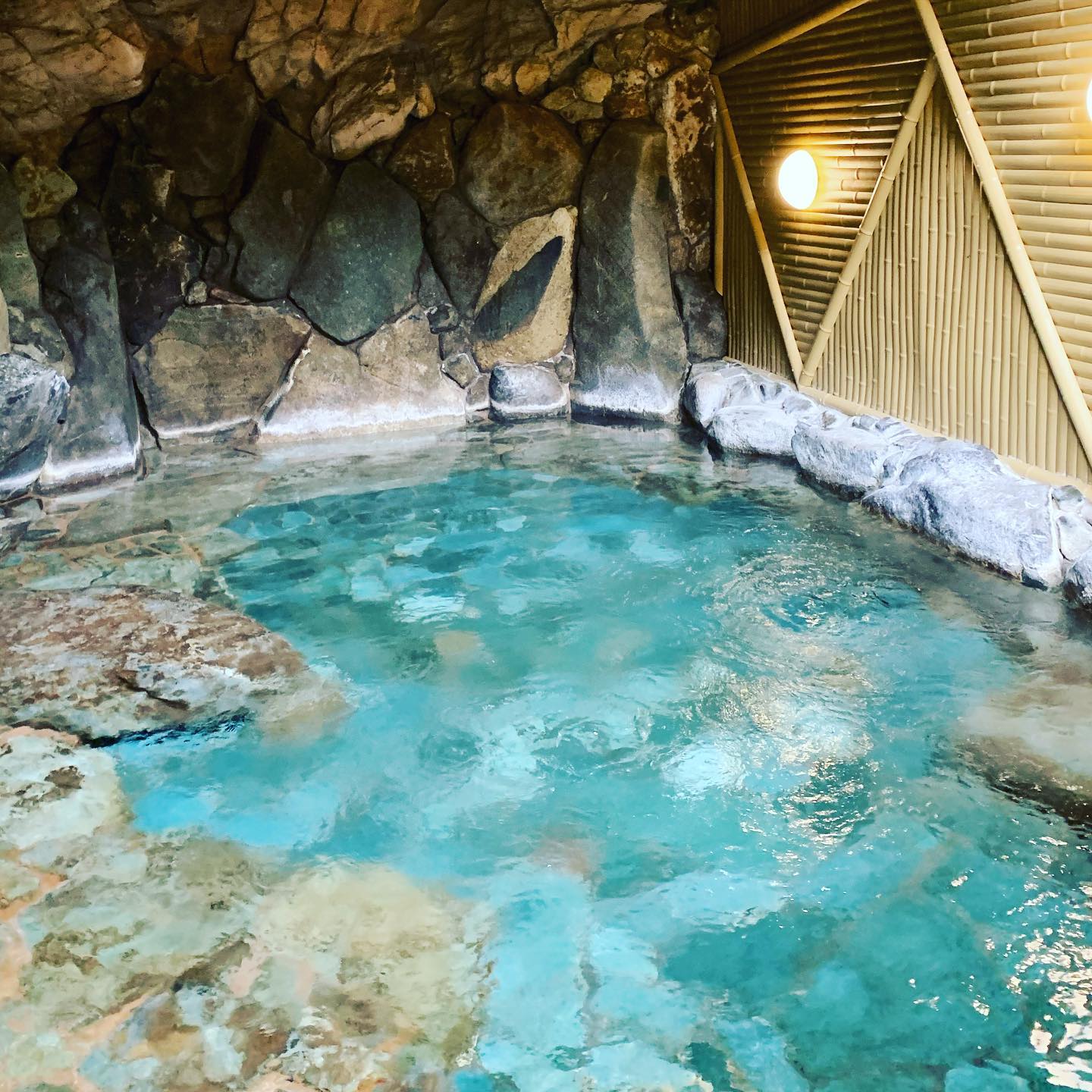 Ichino-Yu public bathhouse.
Ichino-Yu public bathhouse.
Image credit: @satoshi.ohno.965 via Instagram
Some of the more notable ones are Goshono-Yu whose exterior resembles Kyoto’s Imperial Palace; Ichino-Yu which is designed after a kabuki theatre and features a cave as one of the baths, surrounded by natural boulders; and Jizo-Yu whose building architecture is inspired by a Japanese lantern.
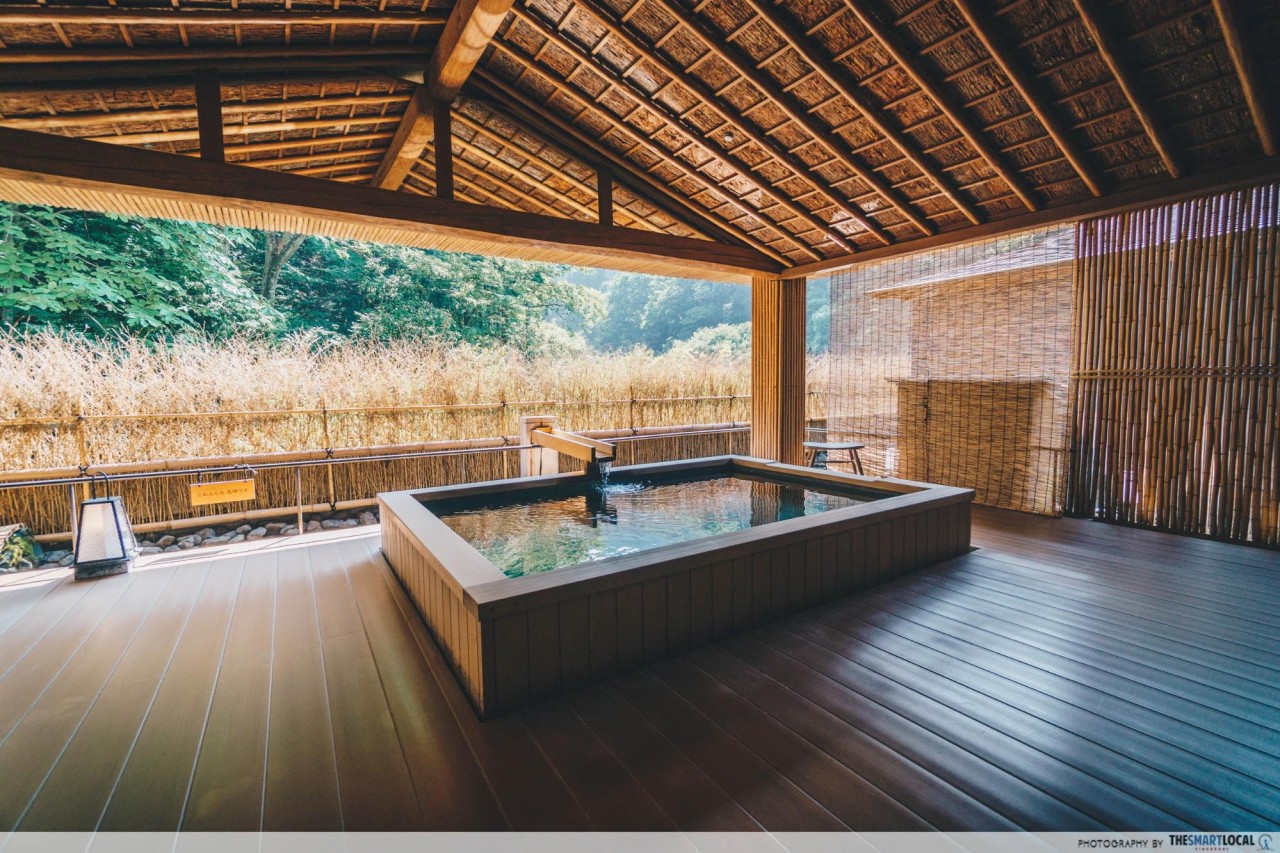 Japanese-style Gingetsu private spa overlooking the forest.
Japanese-style Gingetsu private spa overlooking the forest.
For a more luxurious onsen experience, the Nishimuraya Hotel Shogetsutei offers both private and communal baths within its compound. The Superior Rooms and Suites all come with private open-air baths while the communal areas consist of an indoor long bath, outdoor pool, and a sauna.
Guests staying at the hotel also get access to the public baths at their sister hotel, Nishimuraya Honkan.
Getting there: Take a train from Kyoto to Kinosaki onsen. It will take roughly 2.5 hours.
– Near Sapporo –
9. Jozankei
Affordable ryokan inns 40 min from Sapporo
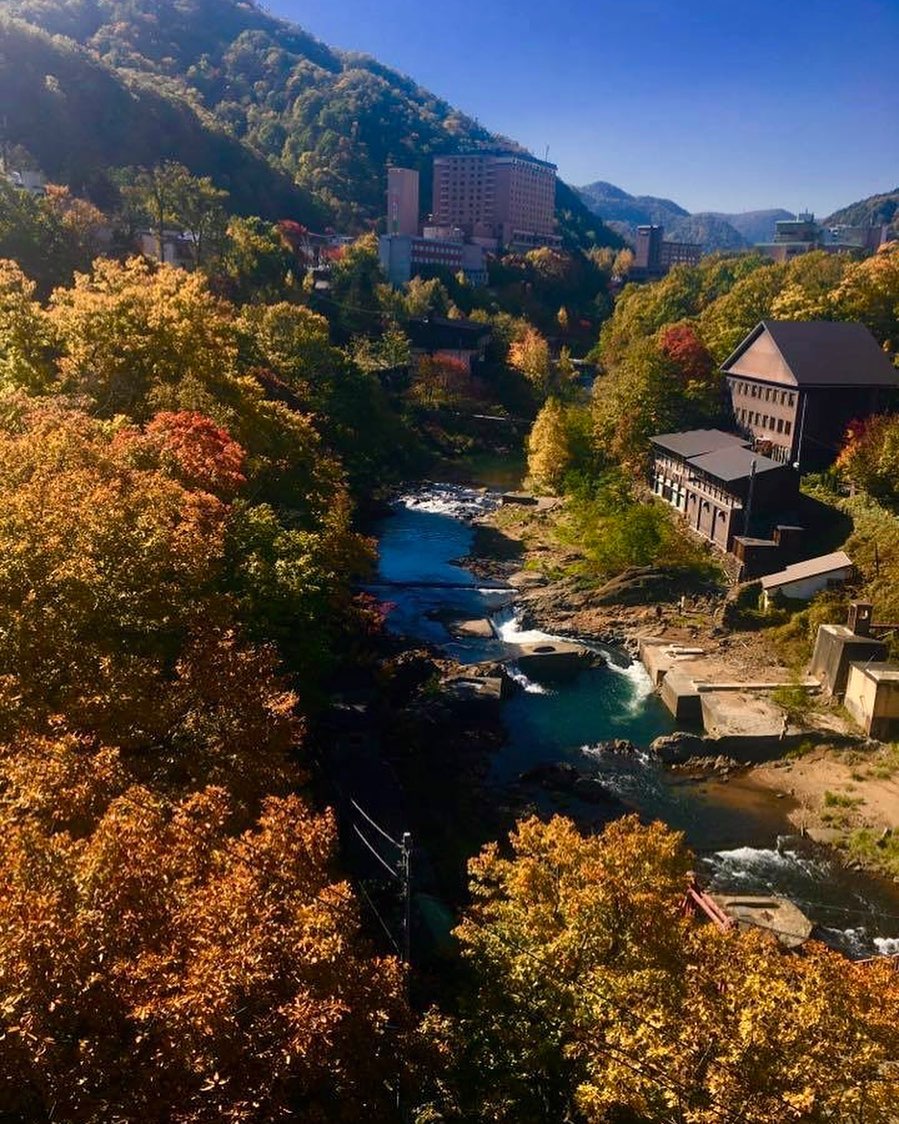
One of the best times to visit Jozankei is during autumn when the whole town turns orange.
Image credit: @botakjonng via Instagram
If you’re on a tight budget but still want to try an onsen, then you’re in luck. The Japanese onsen town Jozankei is just a 40-minute drive from Sapporo or 75 minutes by bus and has a number of ryokan providing day visitors access to their baths from just ¥500 (~S$4.74).
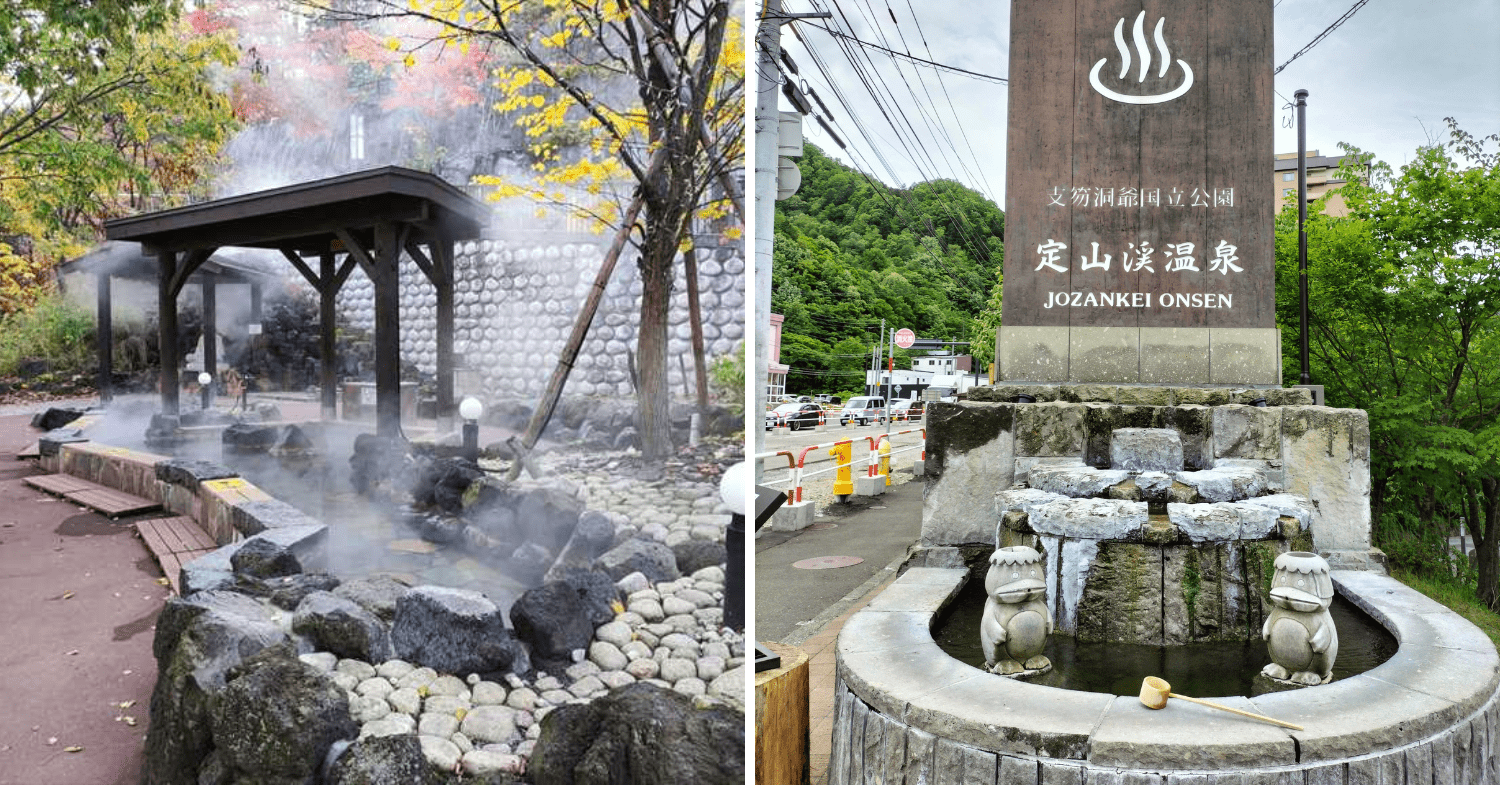 Free baths at Jozankei Gensen Park.
Free baths at Jozankei Gensen Park.
Image adapted from: 北海道&タイの食・遊・住を発信!!「さつろぐ」ジョニー via Google Maps, てつ via Google Maps
Even better news for us Singaporean folks – there are a couple of free open-air public baths scattered around town too. The most popular ones can be found at Jozankei Gensen Park where you can dip your feet or bathe your hands with the hot spring water. Just don’t go soaking your full body in any of these baths.
Getting there: From Sapparo Station bus terminal, take Jotetsu bus 7 or 8. Alternatively, you can take bus 12 from Mokomanai Station.
10. Noboribetsu
“Hell Valley” with volcanic activity
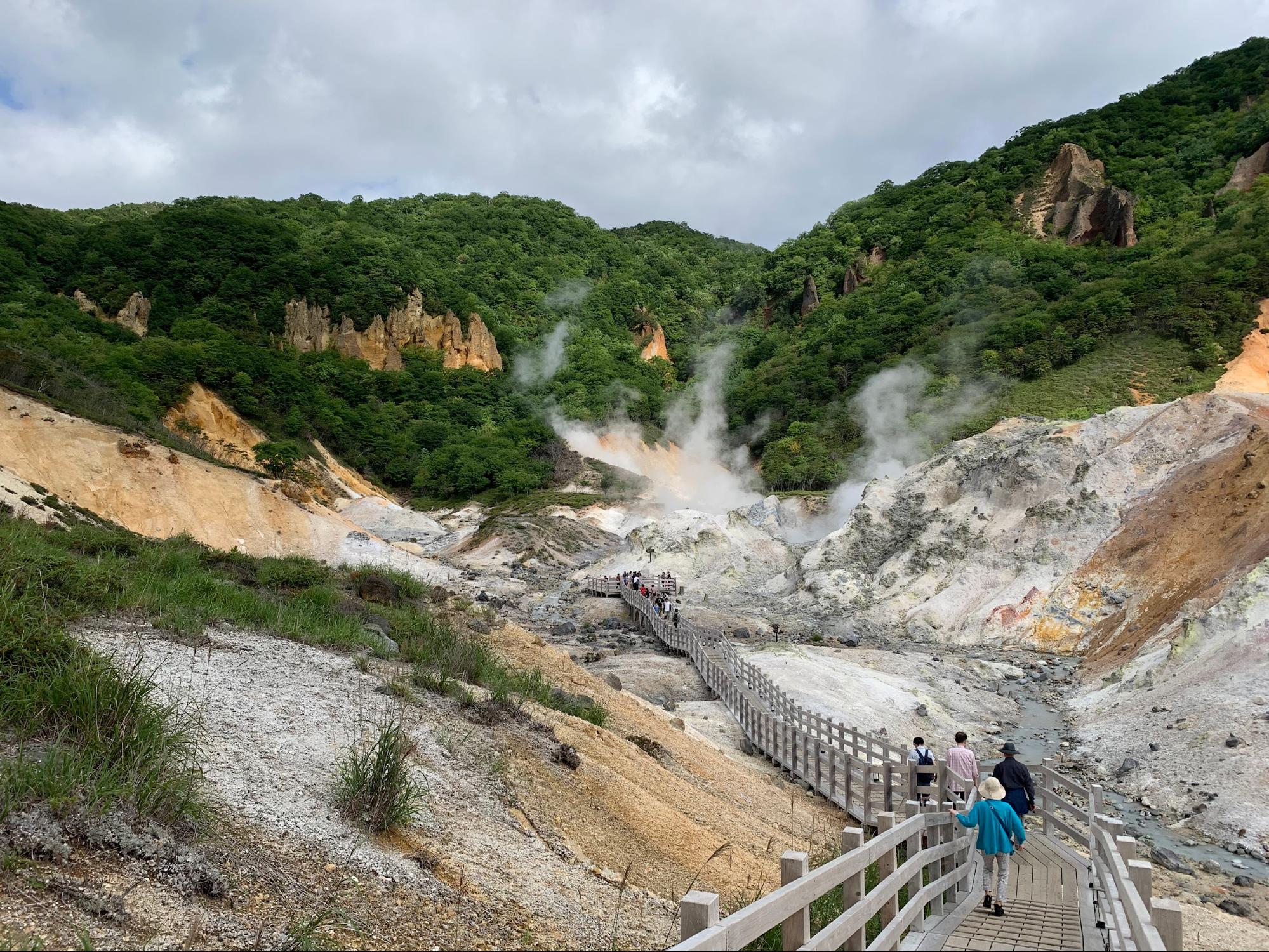 Image credit: Eric Kwok via Google
Image credit: Eric Kwok via Google
2 hours from Sapporo by train, Noboribetsu’s most famous attraction is “Hell Valley”, locally known as Jigokudani. It’s basically a volcanic area with steam vents sprouting from the geothermal grounds. With properly built boardwalks, you’ll be able to safely walk through the valley to see the hot pools and admire the stunning landscape.
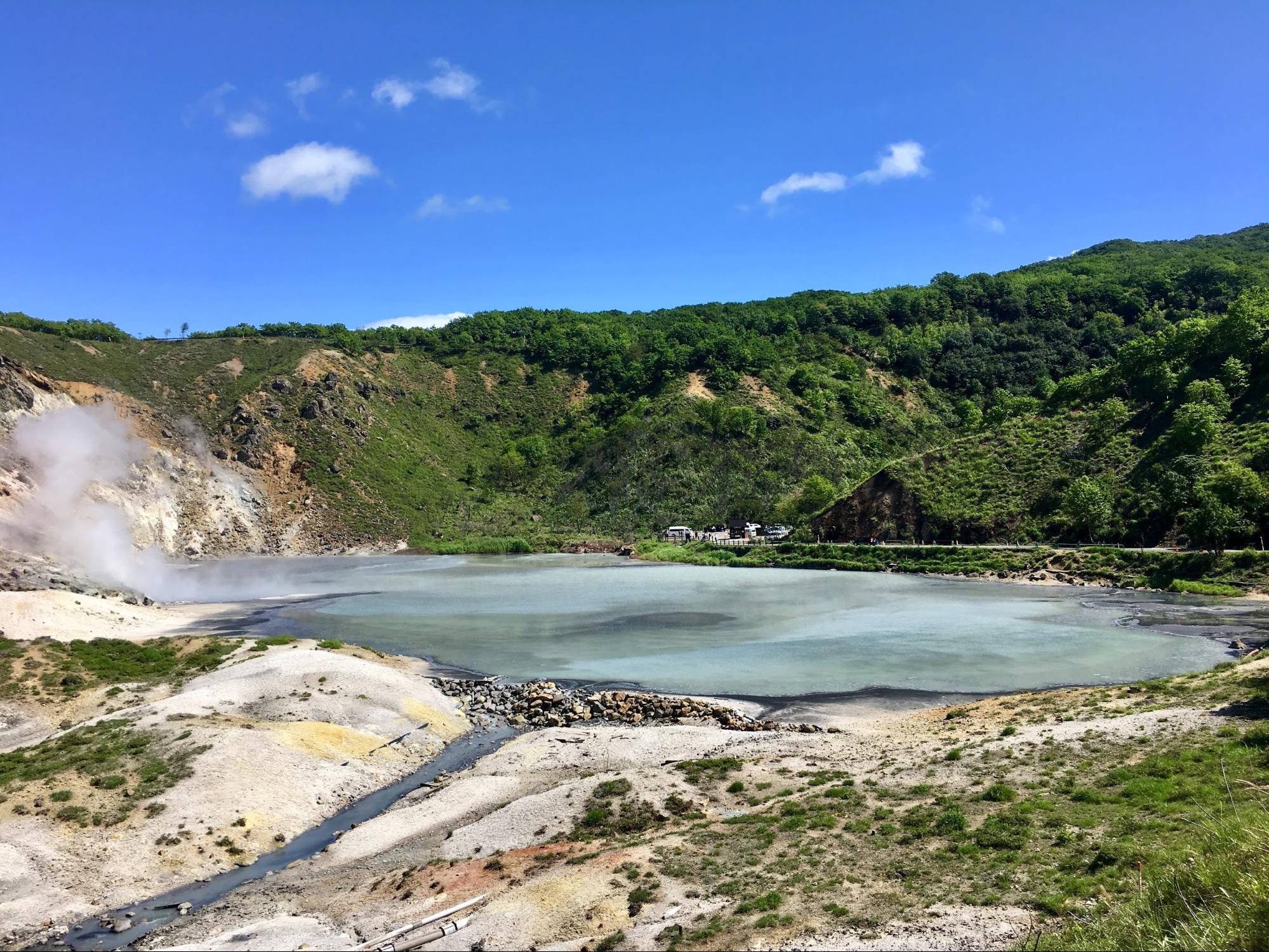 Oyunuma Pond.
Oyunuma Pond.
Image credit: Riccardo Giacalone via Google
Keep trudging along the walking trail for 25 minutes and you’ll be rewarded with Oyunuma – a sulphurous pond that is constantly at 50 degrees Celsius even during the winters due to the volcanic activity nearby.
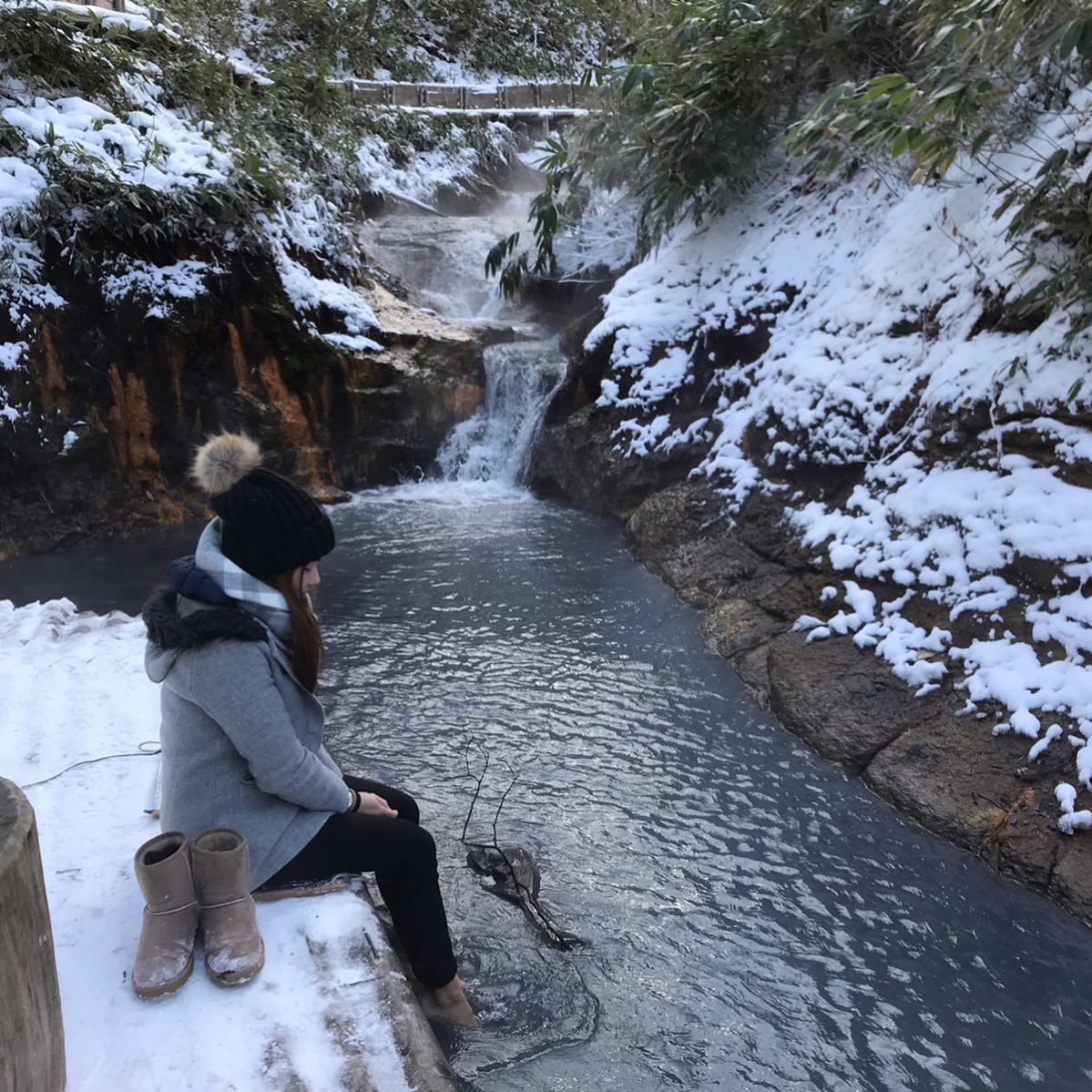
Oyunumagawa river natural footbath.
Image credit: @footloosyy via Instagram
Follow the trail towards the forest to see Oyunumagawa River flowing out of the pond. Sit by the banks of the river and dip your feet into this natural foot bath for free. It’s particularly shiok during snowy weather and a great way to warm yourself up.
Getting there: Take a direct train from Sapparo to Noboribetsu that will take only around 1 hour 15 minutes. You can book a ticket through Klook’s website.
Book a day tour to Noboribetsu and Lake Toya from Sapporo (~S$76.05).
– Near Fukuoka –
11. Beppu
Natural steam vents all over the town
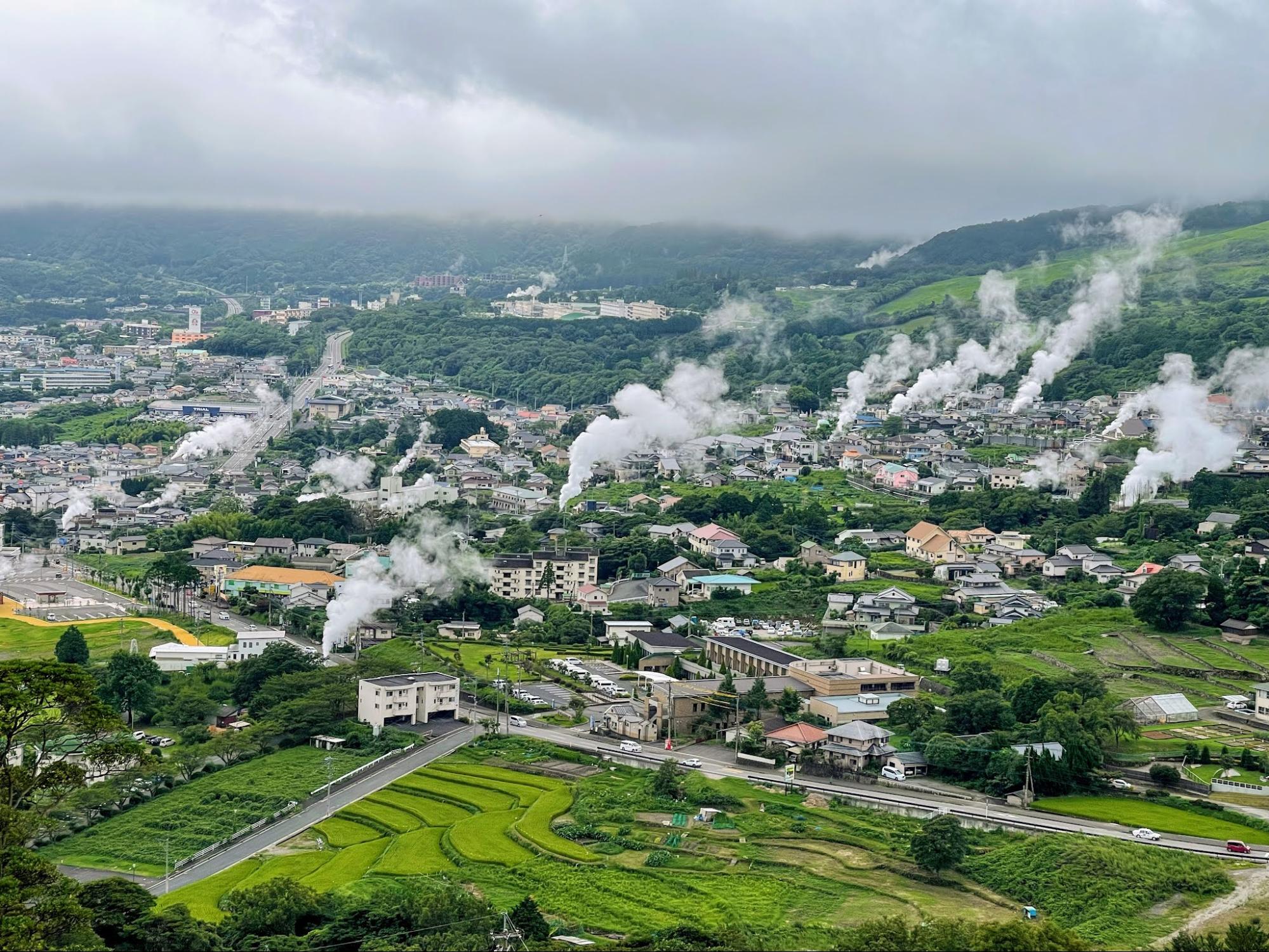 No, that’s not industrial pollution but natural steam vents from the hot springs.
No, that’s not industrial pollution but natural steam vents from the hot springs.
Image credit: 松本道明 via Google
All the way down in southern Japan, the onsen town of Beppu is quite a sight to behold. From a bird’s eye view, it looks like the town is being pressure cooked with all the steam vents taking over the landscape.
It’s been said that during the Kamakura Period – about 800 years ago – samurai bathed in the hot springs here to speed up the recovery of their battle wounds.
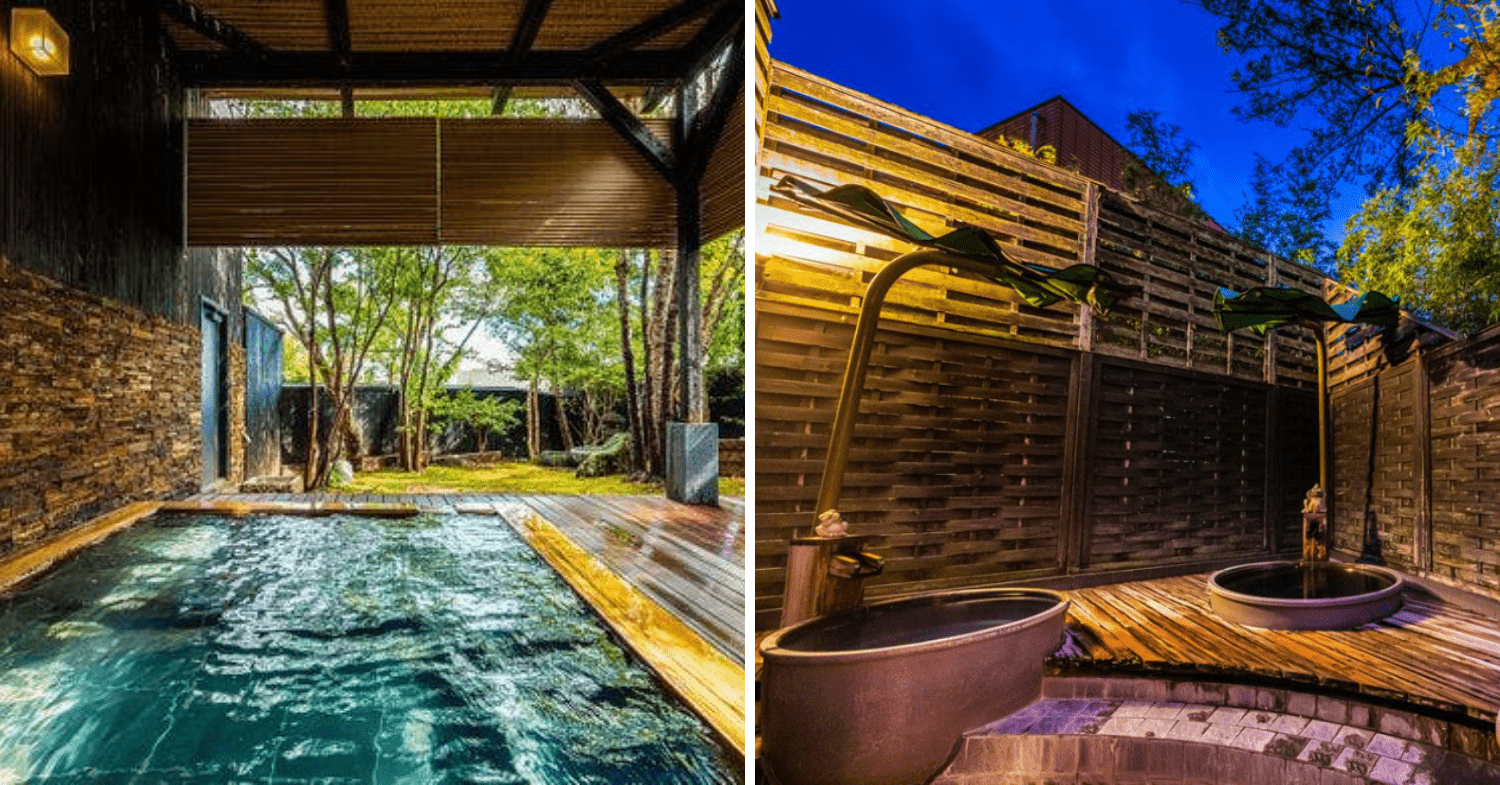
Public bath (left) and couple’s private bath (right) at Ryotei Matsubaya.
Image adapted from: Matsubaya
Those planning to stay overnight in Beppu, can consider Ryotei Matsubaya ryokan which has 5 hot spring baths – 1 public and 4 private. Amongst the latter, there is a mix of indoor, outdoor, and semi-open air baths. Couples looking for a romantic evening can choose the pottery bath where each person sits in a teacup-shaped bath facing each other.
Getting there: To get here, take a 2-hour train ride from Fukuoka or a 4-hour train ride from Kyoto.
12. Yufuin
Less-touristy town surrounded by rice paddies
If Beppu is on your itinerary, it might be worth adding Yufuin as part of your trip too. The onsen town is just a 40-minute drive from Beppu and lies on the foot of Mount Yufu. Due to its rather inaccessible location, you won’t see many tourists in this area which makes it a perfect spot to escape the crowds.
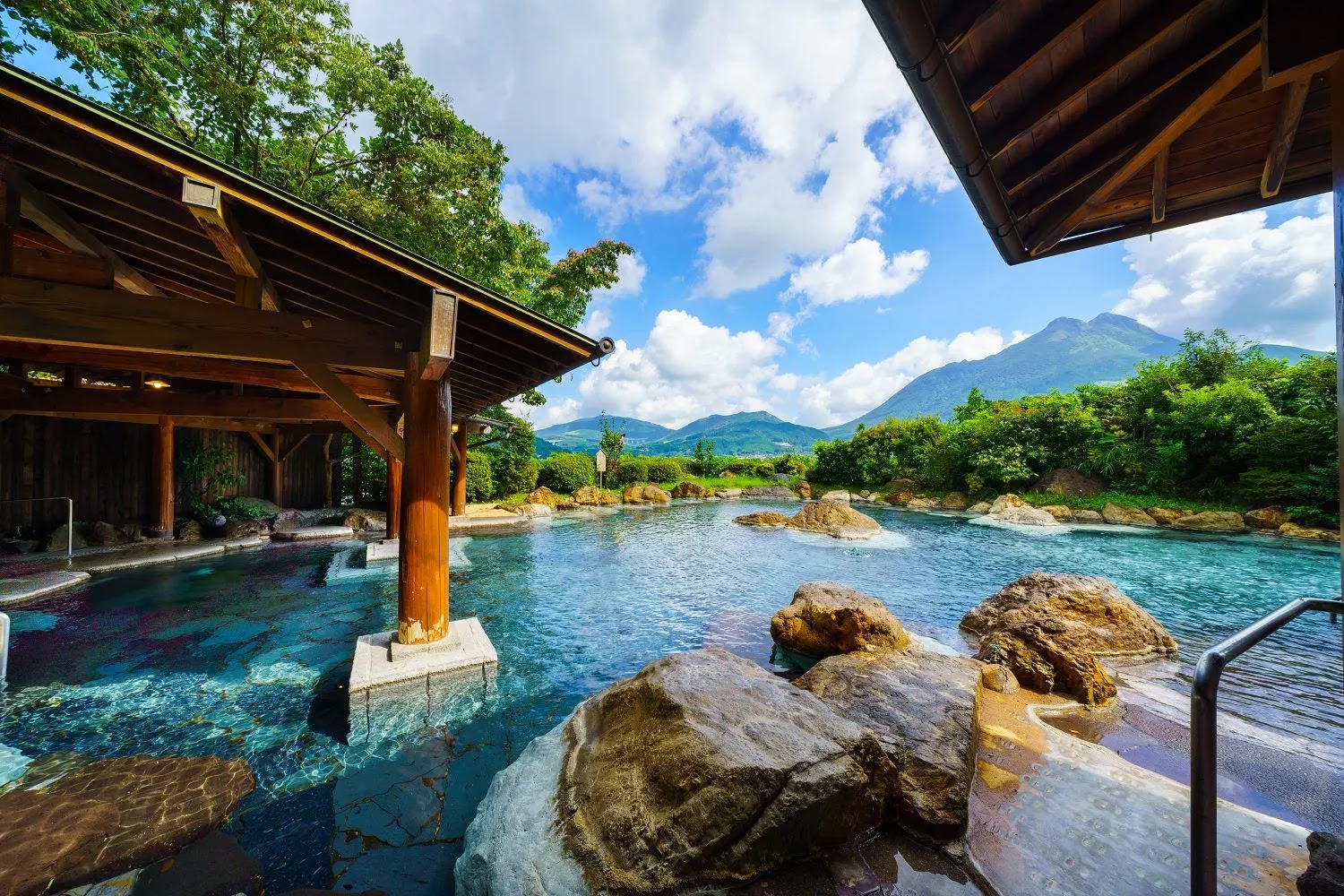
Musouen ryokan outdoor bath.
Image credit: TOM via Google
Most of the town consists of rice paddies and is less developed than the big cities of Japan. Nonetheless, there is a small area in town which is well developed and has both traditional as well as modern hotels for you to experience the hot springs.
Even if you’re not staying the night, most of the ryokan here offer day passes. The outdoor bath at Musouen ryokan is perched above the Yufuin basin and has a clear view of Mount Yufu. Admission is just ¥1,000 (~S$8.55).
Getting there: From Beppu, take a 40-minute drive to Yufuin onsen town.
13. Kurokawa
Riverside onsen town with traditional baths
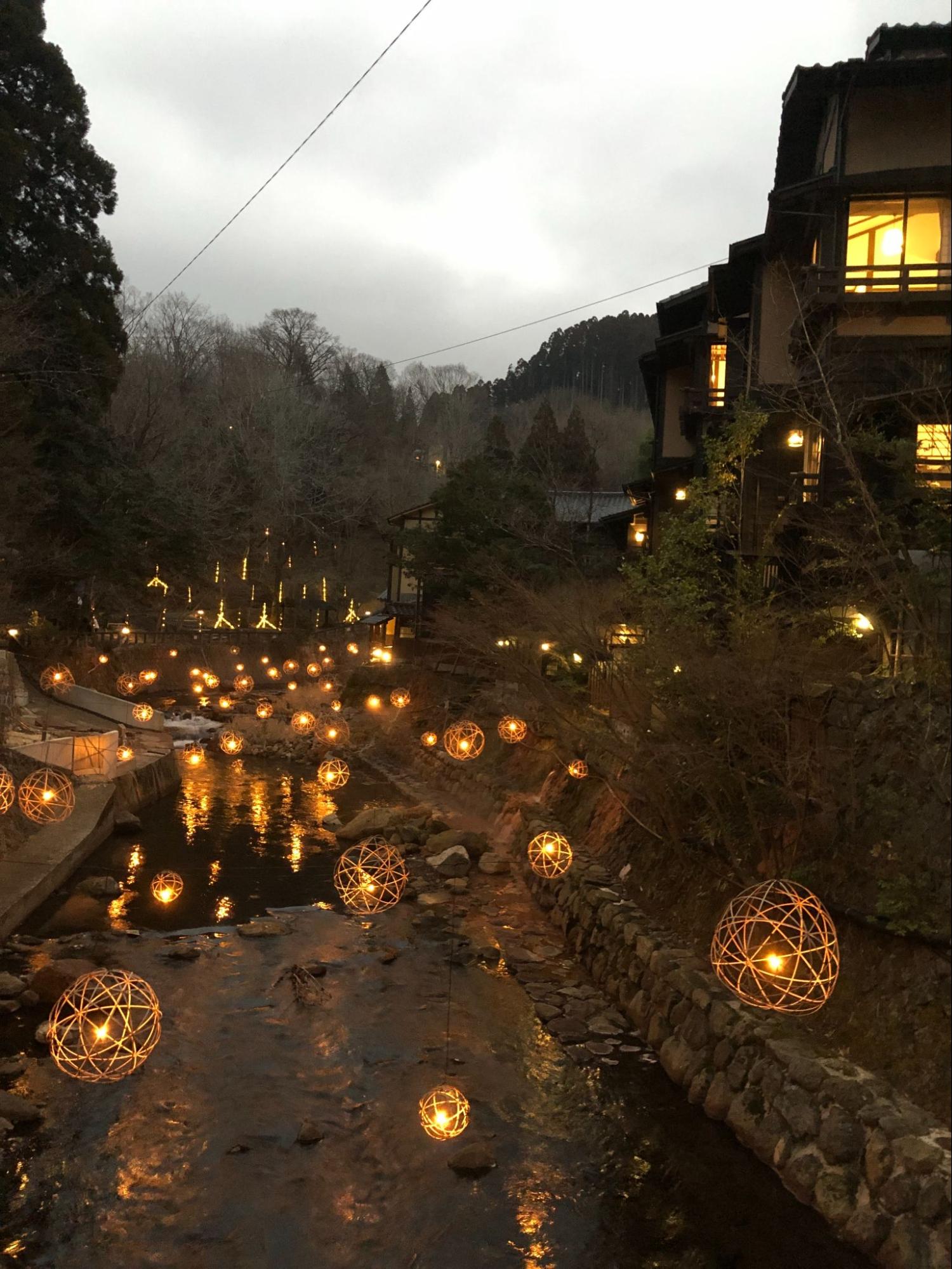 Image credit: CENDRILLONplus via Google Maps
Image credit: CENDRILLONplus via Google Maps
Kurokawa is a small charming village smack in the middle of the Kyushu province. The lure of this onsen town is that it has maintained its olden look and feel – you won’t find any fancy modern hotels here, only traditional ryokan.
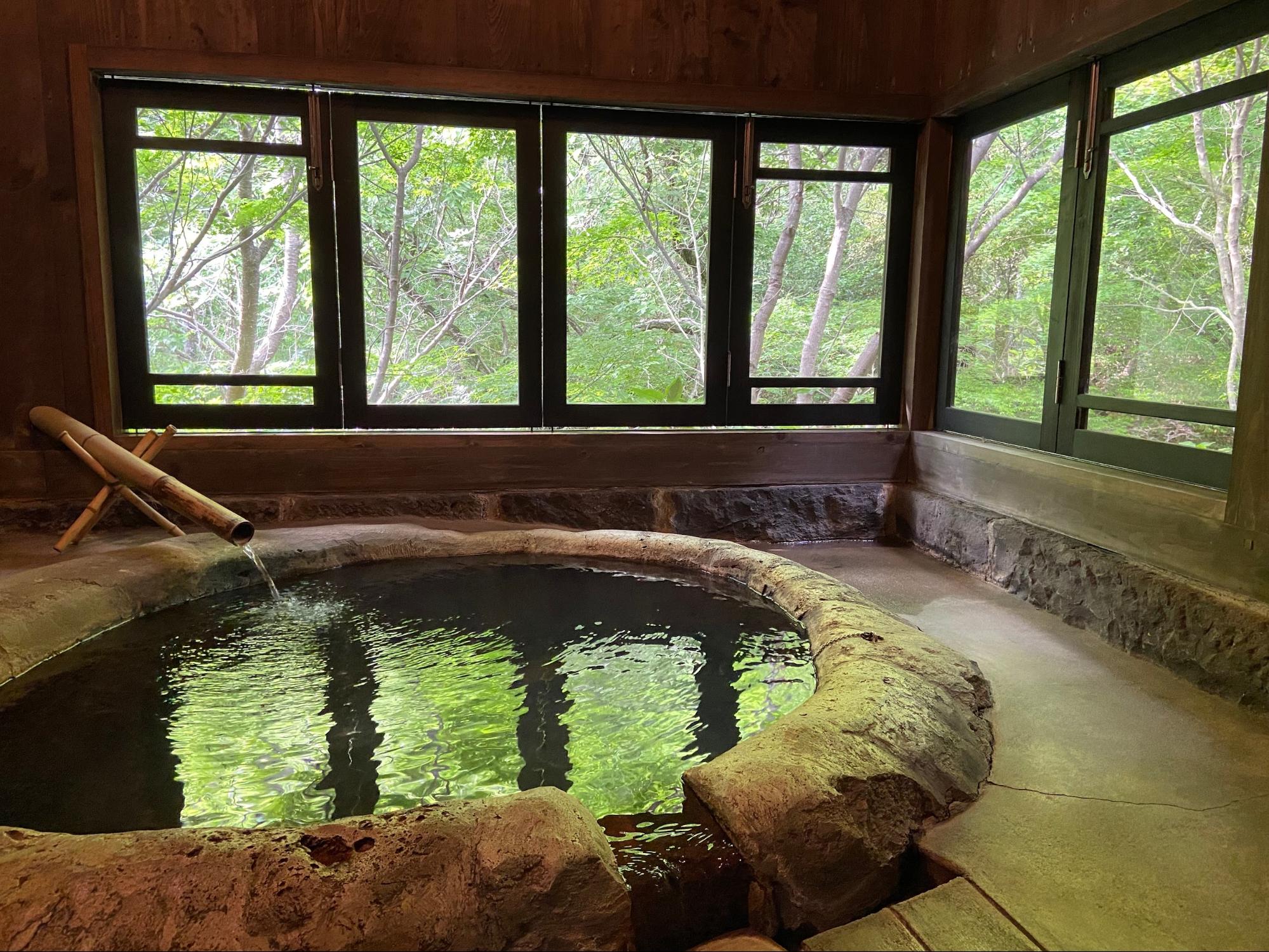
Yamamizuki bathhouse’s indoor bath.
Image credit: サイトウタカノリ via Google
As you walk around town, you’ll notice that most of the buildings are made from wood and stones, giving the place an earthy vibe. Most of the ryokan can easily be found along the river. Get yourself a tegata or wooden pass from the tourist information centre for ¥1,300 (~S$11.11) and it’ll give you access to any 3 baths in town for the day.
Getting there: Drive for 1.5 hours from Fukuoka to Kurokawa Onsen.
Book a 1-day tour of Yufuin and Kurokawa from Fukuoka (S$84.49).
– Bonus –
These places may not be strictly hot springs per se, but they’re still cool spots for you to check out if you want to relax and do some sightseeing. They provide a similar tranquil experience to the other onsens. Plus, you may find yourselves enjoying these places more than you expected to.
Ibusuki
Hot sand bath by the sea
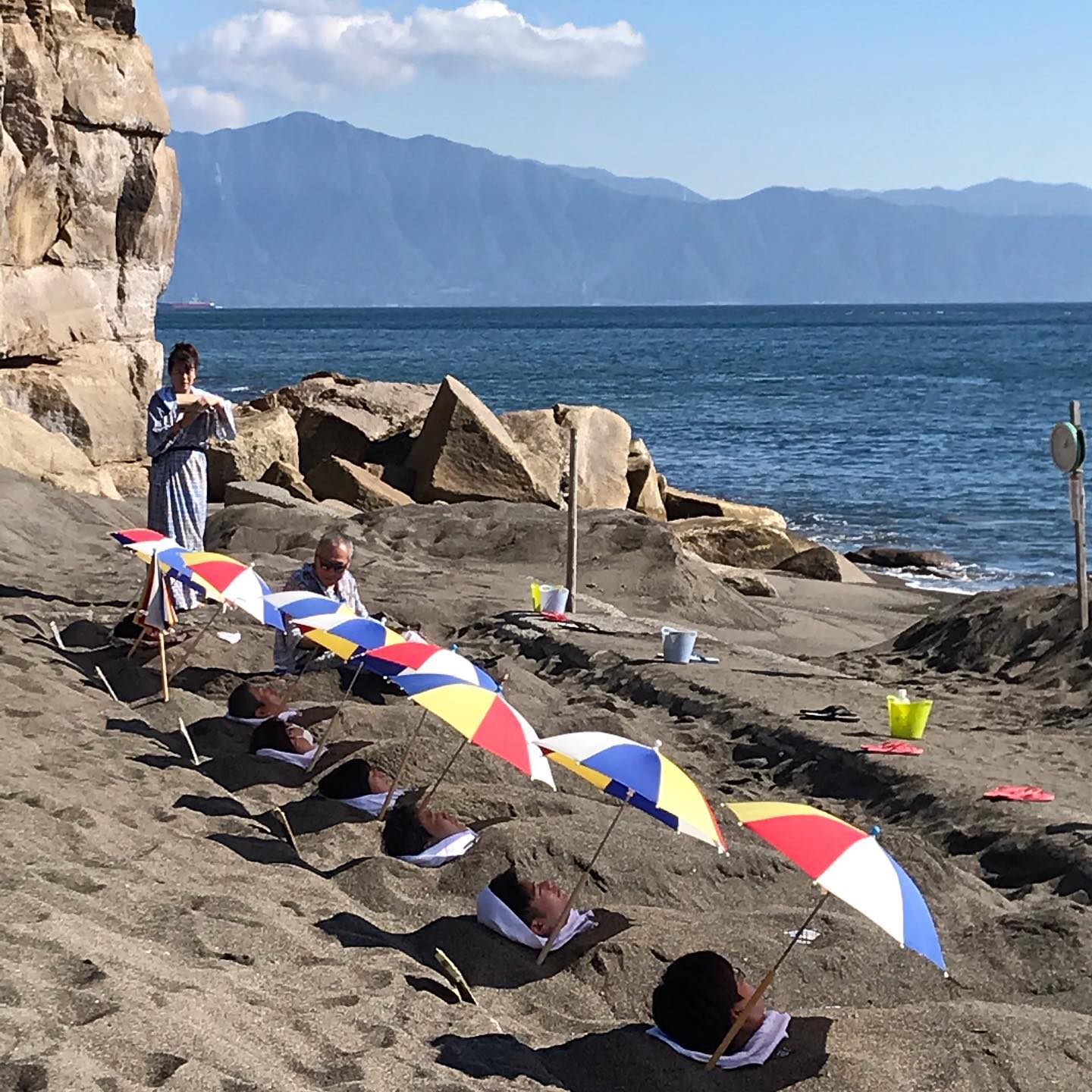
Image credit: @yukari_cielbleu via Instagram
While Ibusuki isn’t your typical Japanese onsen town, it’s the world’s only place with a natural sand bath where you can get buried from neck to toe; apparently it’s more calming than it looks.
If you’re wondering, the heat doesn’t just come from the sun but from the hot spring water bubbling deep under the sand. In just 10 minutes, you will be dripping in sweat. Oh, and no need to be butt naked for this activity – you’ll be wearing a yukata robe before getting in. You can enjoy this experience from as low as ¥1,100 (~$S9.37) at the Ibusuki Hakusuikan Hotel.
Getting there: Take the train from Kagoshima Chuo Station to Ibusuki station, which will take around an hour. Then, take a 15-minute walk from Ibusuki station.
Dogo Onsen Hokkan
Inspired by the film spirited away
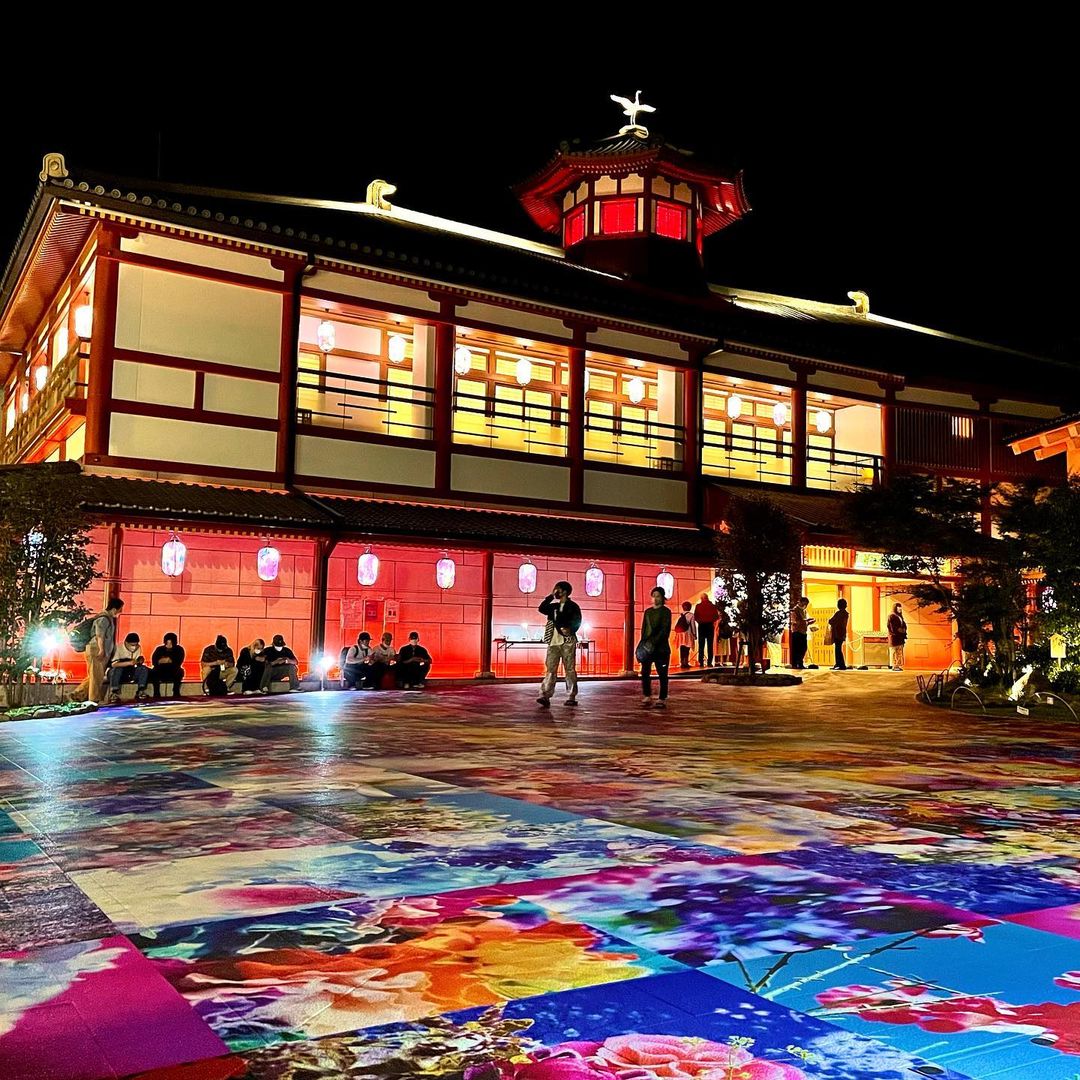
Image credit: @maxazumai0316 via Instagram
For fans of Spirited Away, Dogo Onsen Hakkan is what inspired Yubaba’s bathhouse in the Studio Ghibli film. Located in Matsuyama, it’s one of the oldest operating onsens to date, and has been serving people since 1893.
The cost for an hour’s dip into their public and private hot springs starts from ¥700 (~$S5.91) and ¥2,500 (~$21.10) respectively. Dogo Onen Hakkan is currently undergoing remodelling and will reopen to the public on July 11th 2024. Currently, only the first floor is open to visitors.
Although renovation works are in place, you can still visit the onsen to learn more about its history and lore. For example, you’ll notice that the white heron is a common motif around the onsen, that’s because it’s said that the hot spring was discovered by one. If you want to know more about its history and design, you can sign up for a tour on the Dogo Onsen website.
Getting there: Take tram number 5 from JR Matsuyama Station to Dogo Onsen tram stop. It’s a 5-minute walk to the entrance of the onsen.
Toyosu Manyo Club
24-hour onsen in Tokyo
Toyosu Manyo Club located in Tokyo, near Toyosu Market is easily accessible via the Yurikamome line and a 5-minute walk from Ichiba Mae station.
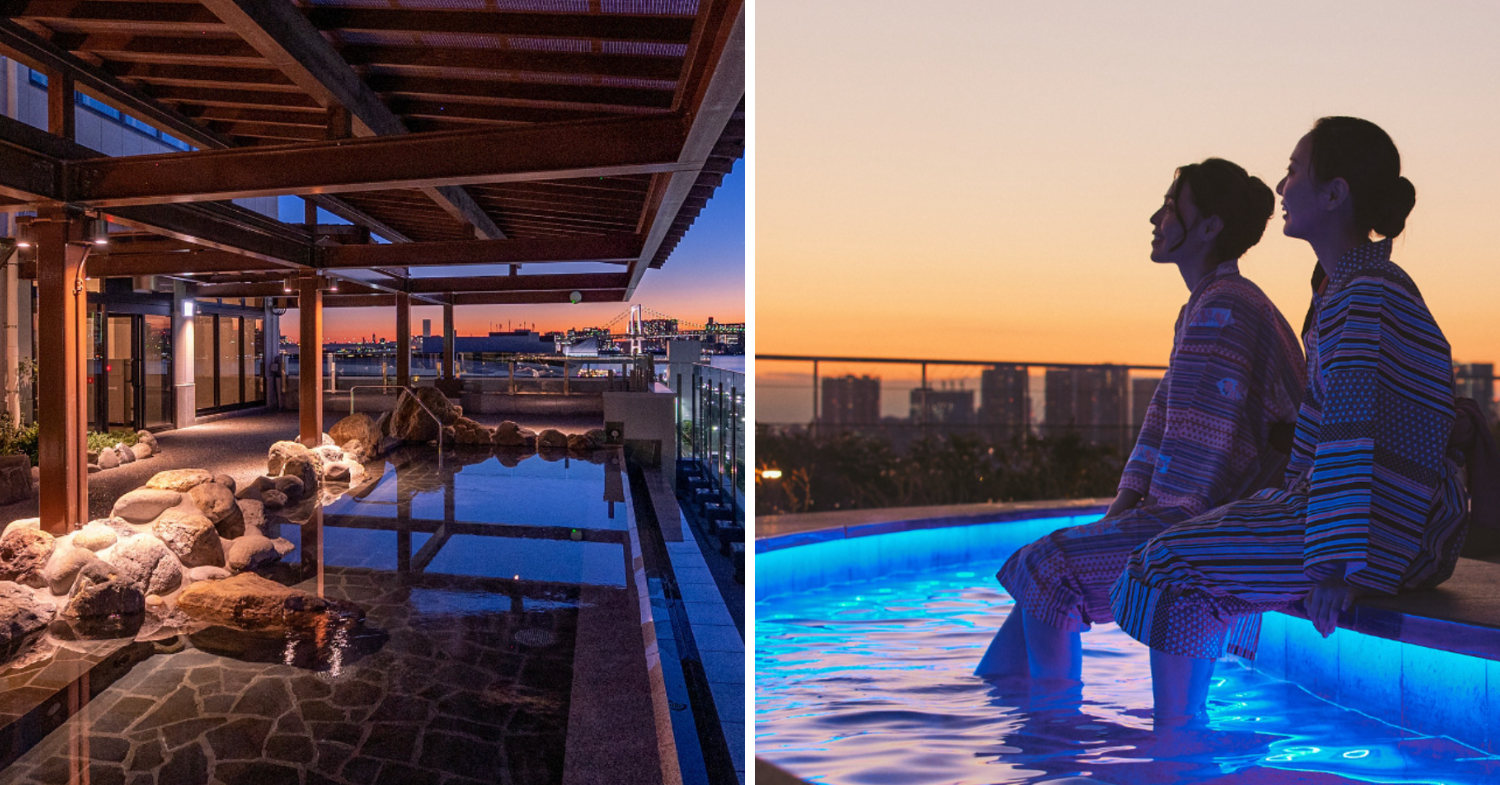 Image adapted from: @manyo_toyosu via Instagram
Image adapted from: @manyo_toyosu via Instagram
Toyosu Manyo Club is a one-stop destination for food, fun, and relaxation for the whole family. There’s a wide range of onsens to choose from including indoor and outdoor onsen as well as private onsens (¥4,500/hour) if you’d rather not show off your bathing suit.
While the club is always open, the best time to head in is around 6pm. It’s right after the afternoon crowd dies down, plus you’ll be just in time to catch the sunset up at the rooftop footbath. It offers a 360-degree view of the Tokyo skyline plus wading pools to soak your feet in.
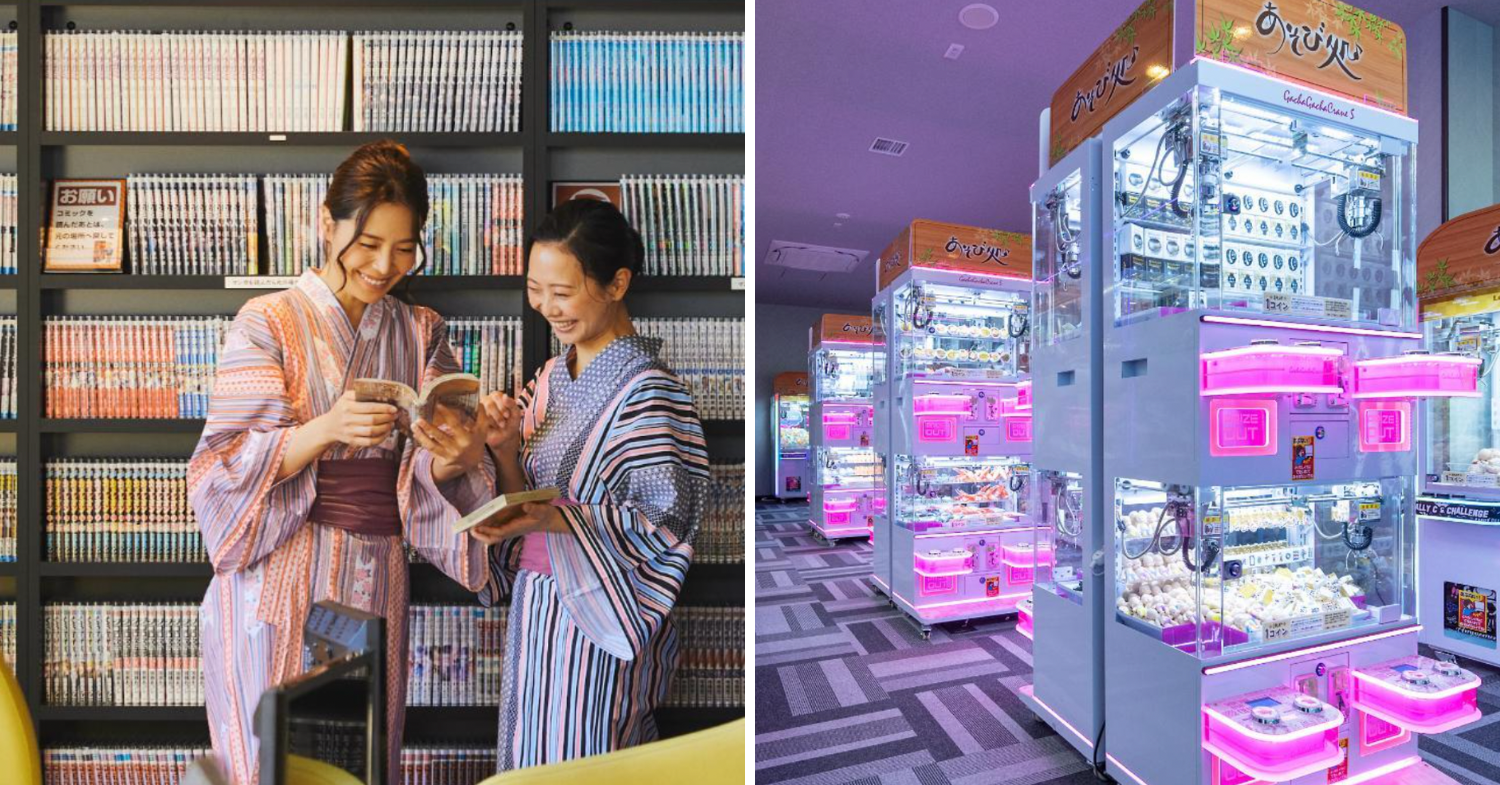 Image adapted from: @manyo_toyosu via Instagram
Image adapted from: @manyo_toyosu via Instagram
After you’re done taking a bath, there are also corners for you to relax in. For tired parents, chill at the recliner chairs while the kids can keep occupied at the game corner, kids’ room, and purikura photo booth.
If you’re feeling peckish, dig into the all-you-can-eat buffet serving international cuisines and fresh seafood from Toyosu Market. They even have a personal hotpot service at this buffet. Make sure to chow down to your fullest potential before the 90-minute dining limit is up.
Visit a Japanese onsen town for a relaxing soak in hot spring waters
There are plenty of reasons to visit Japan, and most Singaporeans don’t need convincing anyway. But the next time you make a trip, add one or more of these Japanese onsen towns to your list of must-visits to get the quintessential Japanese experience.
Other onsen-related stories to check out:
- Japanese onsen spas in Singapore
- Yunomori Onsen: Hidden Japanese spa in Kallang
- I visited a Japanese onsen with my colleagues
Cover image adapted from: 北海道&タイの食・遊・住を発信!!「さつろぐ」ジョニー via Google Maps, @ginzanonsen & @fuji_yurari via Instagram
Originally published on 24th June 2023. Last updated by Ariel Soh & Syahiran Sean on 4th October 2024.

 Sign Up with TSL Connect
Sign Up with TSL Connect

